Itinerary
Valparaíso’s dramatic topography—45 cerros, or hills, overlooking the ocean—requires the use of winding pathways and wooden ascensores (funiculars) to get up many of the grades. The slopes are covered by candy-color houses—there are almost no apartments in the city—most of which have exteriors of corrugated metal peeled from shipping containers decades ago. Valparaíso has served as Santiago’s port for centuries. Before the Panama Canal opened, Valparaíso was the busiest port in South America. Harsh realities—changing trade routes, industrial decline—have diminished its importance, but it remains Chile’s principal port. Most shops, banks, restaurants, bars, and other businesses cluster along the handful of streets called El Plan (the flat area) that are closest to the shoreline. Porteños (which means “the residents of the port”) live in the surrounding hills in an undulating array of colorful abodes. At the top of any of the dozens of stairways, the paseos (promenades) have spectacular views; many are named after prominent Yugoslavian, Basque, and German immigrants. Neighborhoods are named for the hills they cover. With the jumble of power lines overhead and the hundreds of buses that slow down—but never completely stop—to pick up agile riders, it’s hard to forget you’re in a city. Still, walking is the best way to experience Valparaíso. Be careful where you step, though—locals aren’t very conscientious about curbing their dogs.
Day itinerary:
Since time immemorial Valparaiso has inspired writers, poets, musicians and artists alike. If the city is still a little rough around the edges, this only adds to its bohemian ambience; the architecture, style, street art, nightlife, and live music scenes of Valparaiso are some of the best in the world. Add colourful clifftop homes to the mix and you’ll soon see why Valpariaso is many people’s favourite Chilean city. The city was founded in 1536 by Spanish conquistador Juan de Saavedra, who named the city after his birthplace. Many of the colonial buildings he implemented are still standing today, despite the rain, wind, fire and several earthquakes (one of which almost levelled the city in 1906). Quirky architecture also abounds; poetry lovers and amateur architects will no doubt want to make the 45 km trip south to Chilean poet laureate (and Nobel Prize winner) Pablo Neruda’s ship-shaped house and museum for a taste of the extraordinary. The city and region are also extremely well known for their love of good food and wine. The vineyards of the nearby Casablanca Valley – first planted in the early 1980s – have earned worldwide recognition in a relatively short space of time. However, Chile’s viticulture history does date back much farther than that. De Saavedra brought grape vines on his voyage to South America in order to make his own wine and this led to a new grape brandy being created, Pisco. Today give any Chilean a Pisco and wherever they are in the world, they will be home.
Robinson Crusoe Island is located 600 kilometres off the coast of Chile. The island is a rugged volcanic speck where 70 percent of its plant species are endemic, and is the largest of the Juan Fernandez Islands, a small archipelago that since 1935 is a Chilean National Park which was declared a UNESCO World Biosphere Reserve. This island has witnessed and played an important role in Chilean and world history. In 1750 the village of San Juan Bautista was founded at Cumberland Bay and by 1779 there were already 7 fortresses bristling with guns. The island’s isolation offered Spain a splendid place for setting up a penal colony, to which high-ranking Chilean patriots were deported in the early 19th century. In 1915, during the First World War, three British ships and a German one, the Dresden, engaged in a sea battle which ended with the scuttling of the German cruiser. Today there are currently around one thousand people living in the archipelago, most of them in the village of San Juan Bautista engaged in fishing for the “pincer-less lobster”, a delicacy in the mainland.
Day itinerary:
Robinson Crusoe Island is located 600 kilometres off the coast of Chile. The island is a rugged volcanic speck where 70 percent of its plant species are endemic and is the largest of the Juan Fernandez Islands a small archipelago that since 1935 is a Chilean National Park which in 1977 was declared a UNESCO World Biosphere Reserve. This island has witnessed and played an important role in Chilean and world history. In 1704 the Scottish sailor Alexander Selkirk was marooned on the island and stayed for more than 4 years eventually inspiring Daniel Defoe’s novel Robinson Crusoe –hence the name of the island. 1750 the village of San Juan Bautista was founded at Cumberland Bay and by 1779 there were already 7 small fortresses bristling with guns. The island’s isolation offered Spain a splendid place for setting up a penal colony to which high-ranking Chilean patriots were deported in the early 19th century. In 1915 during the First World War three British ships and a German one the Dresden engaged in a sea battle which ended with the scuttling of the German cruiser. Today there are currently around one thousand people living in the archipelago most of them in the village of San Juan Bautista engaged in fishing for the “spiny lobster” a delicacy exported to the mainland.
Discovered (by the Western world) on Easter Sunday, 1722, Easter Island is a UNESCO World Heritage Site and one of the most isolated places on the face of the Earth, some 2,300 miles from the Chilean mainland. Although more Polynesian than South American in character, the 64-square mile island was annexed by Chile in 1888, and is now famous as the world’s largest ‘open air museum’ on account of the Moai, or human-like stone statues, that can be found on the island. The Moai remain very much a mystery, which archaeologists are still trying to unlock by interpreting an ancient language of the Rapa Nui, which is the key to understanding this culture, and is written on the so called ‘rongo rongo tablets’. The island owes its origin to three volcanoes which erupted some three million years ago: Poike, Rano Kau and Maunga Terevaka. It is not known when or how the island was first populated, but the most credible theory suggests that the Rapa Nui people came from other Pacific islands in the 4th century AD. In addition to the cultural and archaeological interest, there are the beautiful beaches, transparent waters, and coral reefs that might be expected of a Pacific Island.
Day itinerary:
Easter Island, the easternmost settled island of Polynesia, received its European name in 1722 when the island was seen by a Dutch expedition under Roggeveen on Easter Sunday. The triangular-shaped island of 163 square kilometers is famous for the hundreds of statues known locally as moai. Rolling hills covered in grassland, eucalyptus forest and a rocky shore surround Hangaroa, the island’s only village on the southwestern coast. This is where Captain Cook landed in 1774, where missionaries built the first church and where ships find the best protection from winds and swells. Small beaches and transparent waters invite swimmers and snorkelers, but it is the cultural aspect which attracts visitors. Since 1935 the island has been a National Historic Monument and today 43.5% of the island is a national park administered by the Chilean National Forest Corporation and Mau Henua, a local community group. The island’s national park has been declared a UNESCO World Heritage Site in 1995. Found slightly more than 3,500 kilometers west of Chile, the island was annexed in 1888. Used as a sheep ranch for many decades, the island was opened in 1965 and an airstrip was built. The US Air Force set up a base to record the behavior of the earth’s outer atmosphere and by 1987 NASA had the runway extended as an emergency runway for the space shuttle. This never happened, but tourism benefitted from this improvement and today the island receives more than 100,000 visitors a year.
Discovered (by the Western world) on Easter Sunday, 1722, Easter Island is a UNESCO World Heritage Site and one of the most isolated places on the face of the Earth, some 2,300 miles from the Chilean mainland. Although more Polynesian than South American in character, the 64-square mile island was annexed by Chile in 1888, and is now famous as the world’s largest ‘open air museum’ on account of the Moai, or human-like stone statues, that can be found on the island. The Moai remain very much a mystery, which archaeologists are still trying to unlock by interpreting an ancient language of the Rapa Nui, which is the key to understanding this culture, and is written on the so called ‘rongo rongo tablets’. The island owes its origin to three volcanoes which erupted some three million years ago: Poike, Rano Kau and Maunga Terevaka. It is not known when or how the island was first populated, but the most credible theory suggests that the Rapa Nui people came from other Pacific islands in the 4th century AD. In addition to the cultural and archaeological interest, there are the beautiful beaches, transparent waters, and coral reefs that might be expected of a Pacific Island.
Day itinerary:
Easter Island, the easternmost settled island of Polynesia, received its European name in 1722 when the island was seen by a Dutch expedition under Roggeveen on Easter Sunday. The triangular-shaped island of 163 square kilometers is famous for the hundreds of statues known locally as moai. Rolling hills covered in grassland, eucalyptus forest and a rocky shore surround Hangaroa, the island’s only village on the southwestern coast. This is where Captain Cook landed in 1774, where missionaries built the first church and where ships find the best protection from winds and swells. Small beaches and transparent waters invite swimmers and snorkelers, but it is the cultural aspect which attracts visitors. Since 1935 the island has been a National Historic Monument and today 43.5% of the island is a national park administered by the Chilean National Forest Corporation and Mau Henua, a local community group. The island’s national park has been declared a UNESCO World Heritage Site in 1995. Found slightly more than 3,500 kilometers west of Chile, the island was annexed in 1888. Used as a sheep ranch for many decades, the island was opened in 1965 and an airstrip was built. The US Air Force set up a base to record the behavior of the earth’s outer atmosphere and by 1987 NASA had the runway extended as an emergency runway for the space shuttle. This never happened, but tourism benefitted from this improvement and today the island receives more than 100,000 visitors a year.
Day itinerary:
Think of French Polynesia and you are automatically transported to the white sands of Tahiti, the blue seas of Bora Bora or, at the very least, the iconic statues of Easter Island. Now, imagine a place that is home to that majestic trinity, but has no crowds and is full of island authenticity that is rare in these global times. You have just imagined Nuku Hiva. The island is the second largest after Tahiti in the archipelago, but is yet to be discovered by tourism. As part of the Marquesas Islands, Nuku Hiva is technically French, but don’t expect to find any blue and white striped shirts here! In fact, even though French is the “official” language of the island, a sing-song dialect of Tahitian mixed with Marquesan is more widely spoken. The younger generations also speak English. Undeniably, Nuku Hiva has been blessed by the Gods. With towering mountains, eight magnificent harbours, and one of the world’s highest waterfalls, Nuku Hiva is rich with Mother Nature’s jewels. The island could lay claim to a great many claims to fame, such as its deep, unpolluted waters, its lush forests bursting with vitality or its fascinating assortment of archaeological interests including tikis (sacred statues) and pae pae (stone platforms that formed the foundations of houses). Yet for those in the know, the island’s primary claim to fame is that author Herman Mellville deserted his ship in order to live among the natives of the island and his books Typee and Omoo were inspired by his experiences on Nuku Hiva.
Day itinerary:
The largest of the southern islands Hiva Oa the master pillar or finial post of the ‘Great House’ – which represents the Marquesan archipelago in the local mythology – has always been the rival of Nuku Hiva. The island is shaped like a seahorse and has a mountain range running southwest to northeast whose main peaks Mt. Temetiu and Mt. Feani form a real wall around Atuona. Atuona a peaceful little port at the head of the Taaoa Bay also known as Traitors Bay has emerged from obscurity due to having had the privilege of being the last resting place of Paul Gauguin and of the singer Jacques Brel. The tombs of these famous personalities are on the side of the Calvary cemetery looking out across the bay and are places of great pilgrimage. In the village the Gauguin Museum displays items related to the painter’s stay there at the beginning of the century and has copies of his works.
Day itinerary:
Rangiroa is French Polynesia’s largest atoll. More than 400 motu (islets) enclose the lagoon, which is so wide and long that one cannot see the southern row of motu from the two main islets in the north –hence the local name Rangiroa meaning wide or long sky, sometimes taken as “immense sky”. There are several passes from the ocean into the lagoon and the two main villages of Avatoru and Tiputa are located next to the passes of the same names. Drift diving and snorkeling the incoming tides looking for sharks and manta rays at these passes is one of Rangiroa’s main touristic draws. Government jobs, ecotourism and pearl farming are the main sources of income on the atoll. The lagoon’s calm turquoise waters, rich marine underwater world and relaxed atmosphere attract visitors year-round to the many local guesthouses and a few hotels. Both Avatoru and Tiputa also feature schools for the other Tuamotu Islands which have no higher education possibilities. One of Rangiroa’s most unusual attractions is the white and rose wine produced on the islet immediately west of Avatoru –the wine has won several awards.
Day itinerary:
Although it lies between Moorea and Bora Bora, Huahine (pronounced Hu-a-hee-nee or Wha-hee-nee) isn’t on the tourist circuit just yet, but it should be. Its near-deserted roads and villages and wooded hills entwined with jungle vines beckon those looking for a little R&R.Huahine is two islands (Huahine Nui and Huahine Iti) joined by a bridge. What passes for action takes place in the main town of Fare (pronounced far-ay) on Huahine Nui, the northern and bigger island. Away from this little port, life is slow-paced and you’ll be lucky to find anyone stirring on a lazy afternoon in any of the villages of Huahine Iti. Most locals ride bicycles and agriculture’s still the main industry—plantations grow vanilla and melons. There are various legends surrounding the island’s name. Some say that hua> means “sex” and hine means “woman,” while others say the name means “pregnant woman” due to a rock outline on Huahine Nui’s Fitii Peninsula. Then there’s the legend of Hiro, Polynesia’s most famous god. It’s said that Hiro rammed his canoe into the island, splitting it down the middle. Not far from the town of Maroe is a rock spire called Te Moa o Hiro or “penis of Hiro”—you can’t miss it. It’s easy to explore Huahine (75 square km [47 square mi]) by rental car, as there is really only one road, albeit with a few forks in it. When you cross the bridge into Huahine Iti you can go either left to Maroe or right to Parea. The road to Haapu leads off to a dead end. When crossing from Huahine Iti to Nui the same rule applies. Take the left fork to the “busy” town of Fare and the right fork to the “sacred eel” village of Faaie, via the Belvedere lookout. Hiring your own boat allows you to circle the island and anchor at the motu; a couple of self-catering villas provide both a car and a boat. There are only one or two restaurants on Huahine Iti; you either eat at your pension, choose a pension with cooking facilities, or drive up to Fare for a wider, though still rather limited, choice.
Simply saying the name Bora Bora is usually enough to induce gasps of jealousy, as images of milky blue water, sparkling white beaches and casually leaning palm trees immediately spring to mind. The imagination doesn’t lie, either, and if you visit, you’ll soon realise this island is every bit as gorgeous as you ever imagined. Thatched wooden huts stand out over shallow, sparkling seawater, with vivid fish swirling just below. Soak up the sun, scuba dive, or simply revel in the opulent luxury of one of the island’s many magnificent resorts. If blissful inactivity doesn’t appeal, then get active, and hike the greenery of the sharp Mount Pahia.
Day itinerary:
If you have ever dreamt up your ideal island holiday, we suspect it goes something like this: Soapy blue seas? Check. Sparkling white beaches? Check. Thatched wooden huts, gently sloping palm trees and kaleidoscopic marine life? Check, check and check. And yet, even by ticking every box, first time viewing of Bora Bora still beggars belief. This tropical hideaway less than 12 m2 in the heart of the South Pacific has been toping travel wish lists for years. Long considered the realm of honeymooners – spectacularly romantic sunsets are a speciality – Bora Bora is not just for wandering with your love. If the prismatic shades of blue of the world’s most beautiful lagoon do not fill you up, then perhaps underwater scooters and aqua Safaris will charge your batteries. If exploring Bora Bora’s lush hinterland is more your glass of tequila sunrise, then trips around the island (often stopping off at the celebrity haunt Bloody Mary Restaurant & Bar) are a must. Bora Bora’s peaceful ambience has not always been the case. The island was a US supply base, known as “Operation Bobcat” during WWII. During this time, Bora Bora was home to nine ships, 20,000 tons of equipment and nearly 7,000 men. Eight massive 7-inch naval cannons were installed around the island, all but one of which is still in place. Although little is known of the history of the island, it is known that Bora Bora was called Vava’u in ancient times. This supports belief that the island was colonised by Tongans prior to French annex in 1888.
Mo’orea is one of the Society Islands of the French Polynesia. Located in the South Pacific, it is considered a magical island thanks to its majestic volcanic mountains, set against warm lagoon waters and green meadows. It is an island that attracts visitors of all abilities wanting to explore both above and below the ocean waters.
Day itinerary:
Moorea is a high mountainous island with two nearly symmetrical bays found on the north coast. The island’s triangular shape has been likened to a heart or a bat. Eight mountain peaks reaching a height of up to 1,207 meters give Moorea a very rugged silhouette. The reef surrounding the island encloses a narrow lagoon –a RAMSAR Wetland- and has barely any motu (reef islets). Sharks and rays are some of the lagoon’s attractions. The island is only one eighth the size of neighboring Tahiti and has a more relaxed life-style. A road leads around Moorea, passing small villages with their churches and the resorts and smaller hotels mainly found on the north coast. A detour into the interior will show large pineapple plantations, French Polynesia’s only agricultural school, ancient marae (stone platforms) and splendid views of the island from Belvedere above Cook’s Bay or the Magic Mountain above Papetoai, Opunohu Bay. Many of the 18,000 residents work in Tahiti, taking one of the ferries plying between Vaiare on the east coast and Papeete. This led to Papeete being one of France’s busiest ports in passenger volume. Foreign visitors either come into Temae airport, tucked in-between the Green Pearl golf course and Temae’s public beach, or by ship entering one of the two bays on the north coast. Both bays are connected to Captain Cook’s visit in 1777: he stayed in Opunohu Bay, but to honor him Pao Pao Bay has been named Cook’s Bay.
Papeete will be your gateway to the tropical paradise of French Polynesia, where islands fringed with gorgeous beaches and turquoise ocean await to soothe the soul. This spirited city is the capital of French Polynesia, and serves as a superb base for onward exploration of Tahiti – an island of breathtaking landscapes and oceanic vistas. Wonderful lagoons of crisp, clear water beg to be snorkelled, stunning black beaches and blowholes pay tribute to the island’s volcanic heritage, and lush green mountains beckon you inland on adventures, as you explore extraordinary Tahiti. Visit to relax inside picturesque stilted huts, which stand out over shimmering water, as you settle into the intoxicating rhythm of life, in this Polynesian paradise.
Day itinerary:
Papeete is the center of the tropical paradise of French Polynesia where islands fringed with gorgeous beaches and turquoise ocean await to soothe the soul. This spirited city is the capital of French Polynesia and serves as a superb base for onward exploration of Tahiti – an island of breathtaking landscapes and oceanic vistas. A wonderful lagoon of crisp clear water begs to be snorkelled stunning black beaches and blowholes pay tribute to the island’s volcanic heritage and lush green mountains beckon you inland on adventures as you explore extraordinary Tahiti. Visit to relax and settle into the intoxicating rhythm of life in this Polynesian paradise.
Papeete will be your gateway to the tropical paradise of French Polynesia, where islands fringed with gorgeous beaches and turquoise ocean await to soothe the soul. This spirited city is the capital of French Polynesia, and serves as a superb base for onward exploration of Tahiti – an island of breathtaking landscapes and oceanic vistas. Wonderful lagoons of crisp, clear water beg to be snorkelled, stunning black beaches and blowholes pay tribute to the island’s volcanic heritage, and lush green mountains beckon you inland on adventures, as you explore extraordinary Tahiti. Visit to relax inside picturesque stilted huts, which stand out over shimmering water, as you settle into the intoxicating rhythm of life, in this Polynesian paradise.
Day itinerary:
Papeete is the center of the tropical paradise of French Polynesia where islands fringed with gorgeous beaches and turquoise ocean await to soothe the soul. This spirited city is the capital of French Polynesia and serves as a superb base for onward exploration of Tahiti – an island of breathtaking landscapes and oceanic vistas. A wonderful lagoon of crisp clear water begs to be snorkelled stunning black beaches and blowholes pay tribute to the island’s volcanic heritage and lush green mountains beckon you inland on adventures as you explore extraordinary Tahiti. Visit to relax and settle into the intoxicating rhythm of life in this Polynesian paradise.
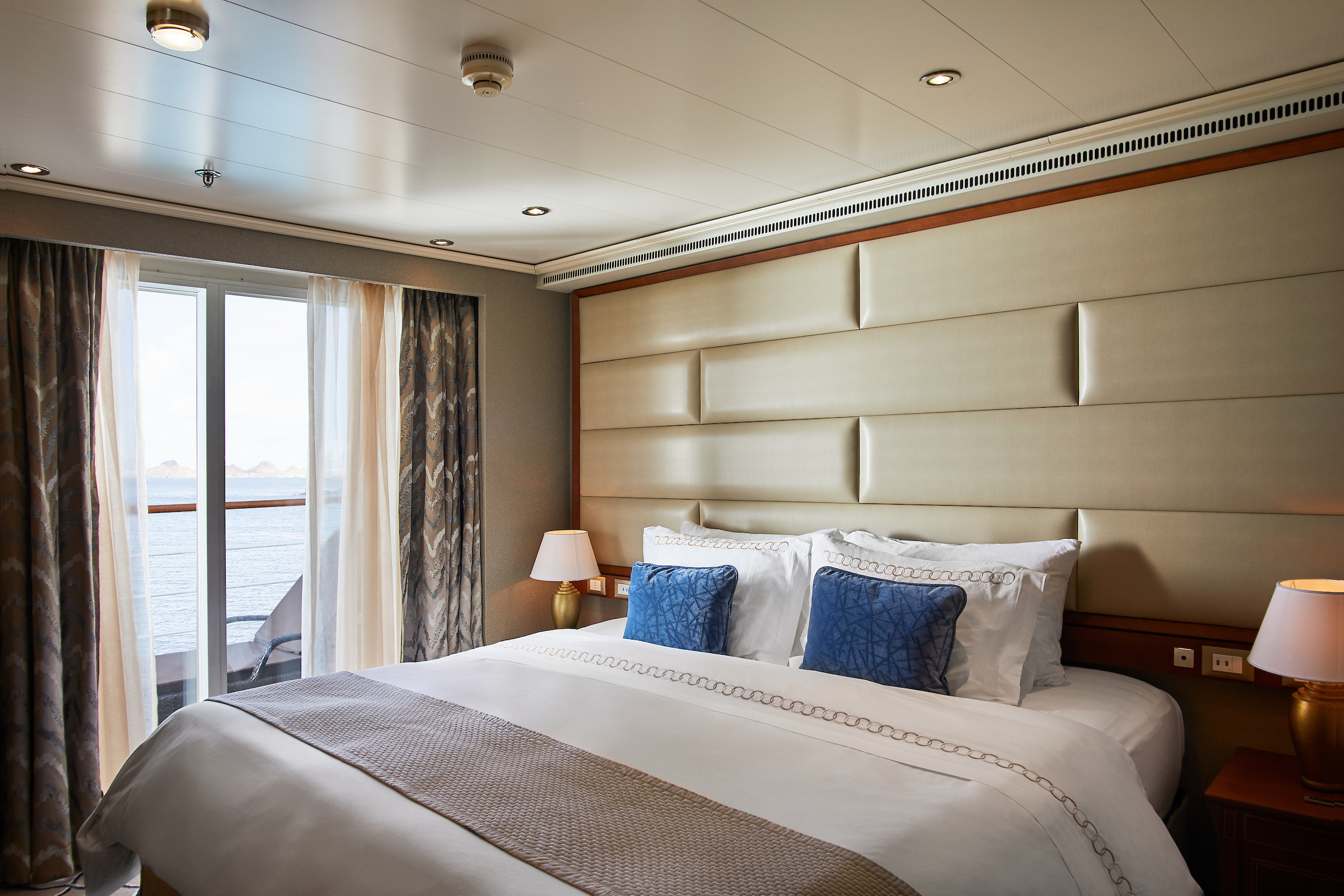
The name says it all. A stylish apartment. Prestigious and classic, as is the Silver Whisper itself. For those who seek the superlative level of space, comfort and service on board. Available as a one-bedroom configuration or as two-bedrooms (as illustrated) by adjoining with a Vista Suite.
One bedroom: 85 sq.m. including veranda
Two bedroom: 117 sq.m. including veranda
Please note that the 3rd guest will sleep on a comfortable sofa bed in the reception area of the suite.
Essentials
- Deck(s): 7
- Section: Mid-Ship
Characteristics
- Veranda
- Separate dining area
- Living room with sitting area
- Double vanity
- Separate shower
- Full-size bath
- Walk-in wardrobe with personal safe
Furniture
- Queen size bed
- Writing desk
- Vanity table
- Luxury bed mattresses
Media & Communication
- Unlimited Premium Wi-Fi
- 2 large flat screen TVs with Interactive Media Library
- Sound system with bluetooth connectivity
- Direct dial telephone
- Wall mounted USB-C mobile device chargers
- Dual voltage 110/220 outlets
Onboard Services
- Butler service
- Complimentary laundry, pressing & wet cleaning
- Daily canapé service, Welcome chocolate, Welcome fruit stand
- Dinner for two in La Dame, one evening per voyage,
- Two hours of worldwide phone use, per voyage segment
- Champagne on arrival
Amenities
- Espresso machine
- Pillow menu
- Refrigerator and bar setup stocked with your preferences
- Plush bathrobe
- Luxury bath amenities
- Umbrella
- Hair Dryer
- Slippers
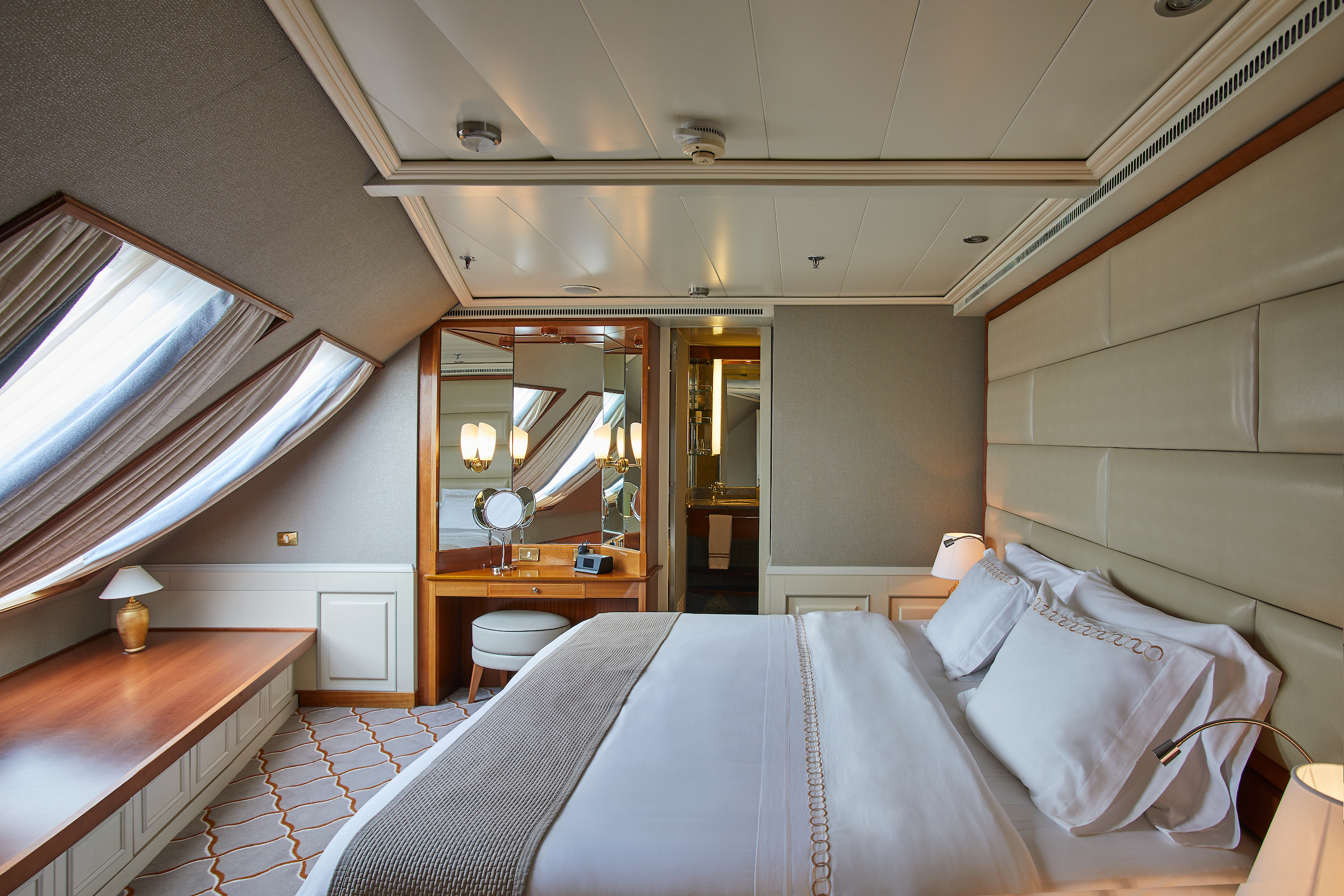
Expertly designed and exquisitely appointed. Ideal for entertaining friends on your luxury cruise or enjoying a quiet dinner “at home”. Available as a one-bedroom suite configuration or as two-bedrooms (as illustrated) by adjoining with a Veranda Suite.
One bedroom: 87-101 sq.m. including veranda
Two bedroom: 119-133 sq.m. including veranda
Please note that the 3rd guest will sleep on a comfortable sofa bed in the reception area of the suite.
Essentials
- Deck(s): 6, 7, 8
- Section: Forward
Characteristics
- Veranda
- Separate dining area
- Living room with sitting area
- Double vanity
- Separate shower
- Full-size bath
- Walk-in wardrobe with personal safe
Furniture
- Queen size bed
- Writing desk
- Vanity table
- Luxury bed mattresses
Media & Communication
- Unlimited Premium Wi-Fi
- 2 large flat screen TVs with Interactive Media Library
- Sound system with bluetooth connectivity
- Direct dial telephone
- Wall mounted USB-C mobile device chargers
- Dual voltage 110/220 outlets
Onboard Services
- Butler service
- Complimentary laundry, pressing & wet cleaning
- Daily canapé service, Welcome chocolate, Welcome fruit stand
- Dinner for two in La Dame, one evening per voyage,
- Two hours of worldwide phone use, per voyage segment
- Champagne on arrival
Amenities
- Espresso machine
- Pillow menu
- Refrigerator and bar setup stocked with your preferences
- Plush bathrobe
- Luxury bath amenities
- Umbrella
- Hair Dryer
- Slippers
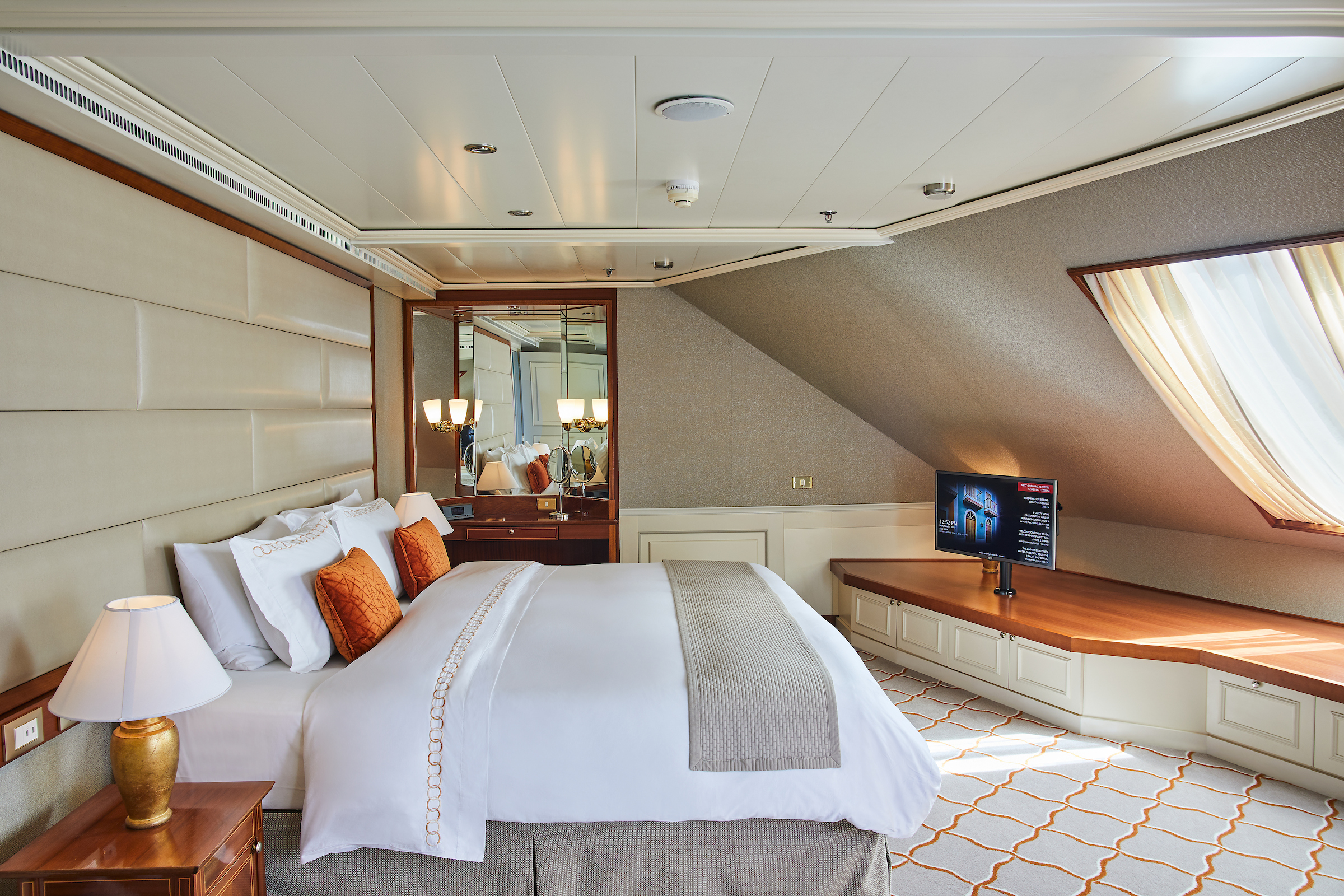
Stately describes the Royal suite. Commanding and majestic. Perfect for entertaining while you cruise. Enough living space to roam.The pinnacle of good living. Available as a one-bedroom configuration or as two-bedrooms (as illustrated) by adjoining with a Veranda Suite.
One bedroom: 90-94 sq.m. including veranda
Two bedroom: 122-126 sq.m. including veranda
Please note that the 3rd guest will sleep on a comfortable sofa bed in the reception area of the suite.
Essentials
- Deck(s): 6, 7
- Section: Forward
Characteristics
- Veranda
- Separate dining area
- Living room with sitting area
- Double vanity
- Separate shower
- Full-size bath
- Walk-in wardrobe with personal safe
Furniture
- Queen size bed
- Writing desk
- Vanity table
- Luxury bed mattresses
Media & Communication
- Unlimited Premium Wi-Fi
- 2 large flat screen TVs with Interactive Media Library
- Sound system with bluetooth connectivity
- Direct dial telephone
- Wall mounted USB-C mobile device chargers
- Dual voltage 110/220 outlets
Onboard Services
- Butler service
- Complimentary laundry, pressing & wet cleaning
- Daily canape service, Welcome chocolate, Welcome fruit stand
- Dinner for two in La Dame, one evening per voyage,
- Two hours of worldwide phone use, per voyage segment
- Champagne on arrival
Amenities
- Espresso machine
- Pillow menu
- Refrigerator and bar setup stocked with your preferences
- Plush bathrobe
- Luxury bath amenities
- Umbrella
- Hair Dryer
- Slippers
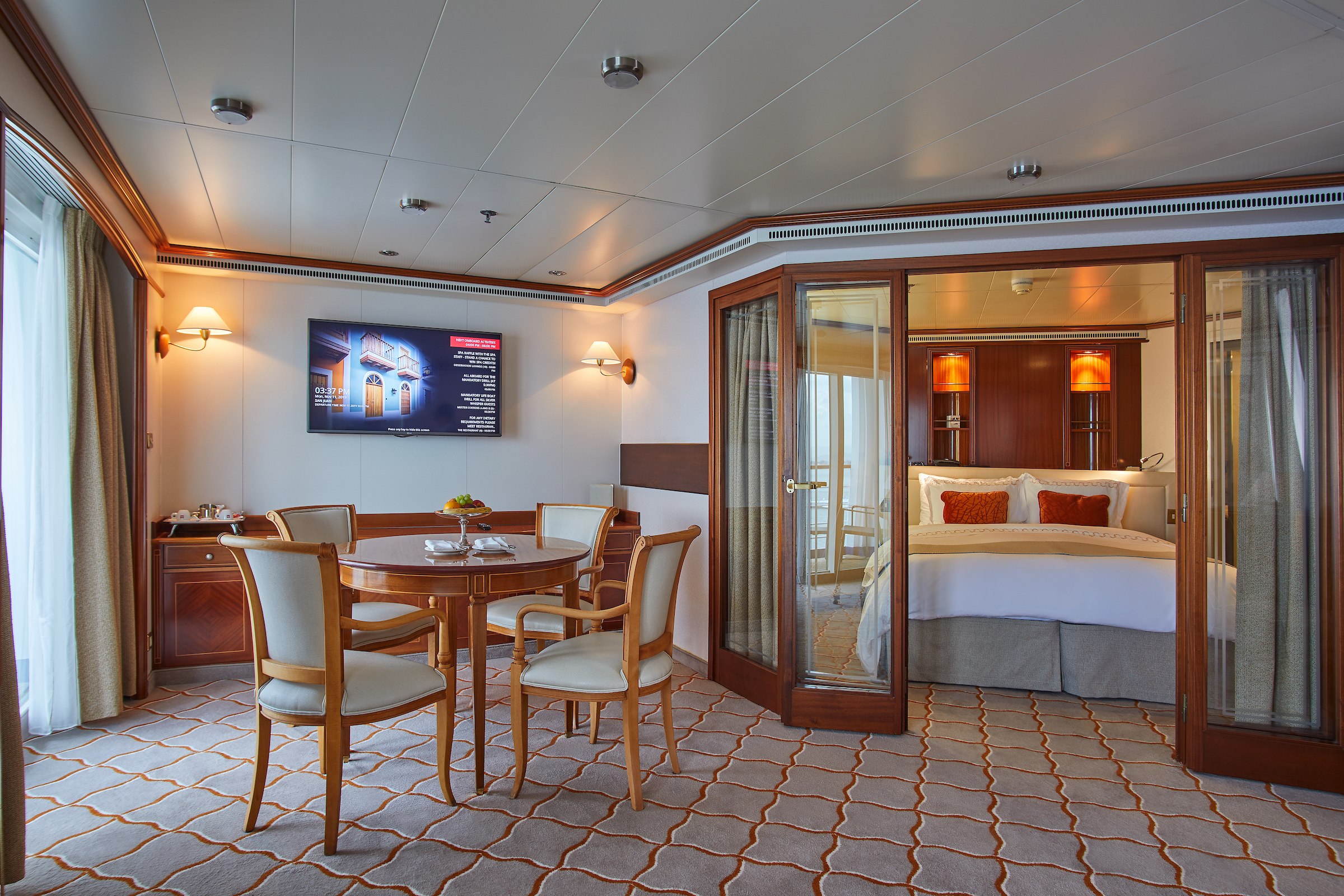
Stylish and sophisticated. Separate dining and living rooms. Larger verandas. Situated midship. Perfection in design for comfortable living. Silver Suites accommodate three guests.
One bedroom: 61-65 sq.m. including veranda
Please note that the 3rd guest will sleep on a comfortable sofa bed in the reception area of the suite.
Essentials
- Deck(s): 7
- Section: Mid-Ship
Characteristics
- Veranda
- Separate dining area
- Sitting area
- Double vanity
- Separate shower
- Full-size bath
- Walk-in wardrobe with personal safe
Furniture
- Queen size bed
- Writing desk
- Vanity table
- Luxury bed mattresses
Media & Communication
- Unlimited Premium Wi-Fi
- 2 large flat screen TVs with Interactive Media Library
- Sound system with bluetooth connectivity
- Direct dial telephone
- Wall mounted USB-C mobile device chargers
- Dual voltage 110/220 outlets
Onboard Services
- Butler service
- Complimentary laundry, pressing & wet cleaning
- Daily canapé service, Welcome chocolate, Welcome fruit stand
- Champagne on arrival
Amenities
- Espresso machine
- Pillow menu
- Refrigerator and bar setup stocked with your preferences
- Plush bathrobe
- Luxury bath amenities
- Umbrella
- Hair Dryer
- Slippers
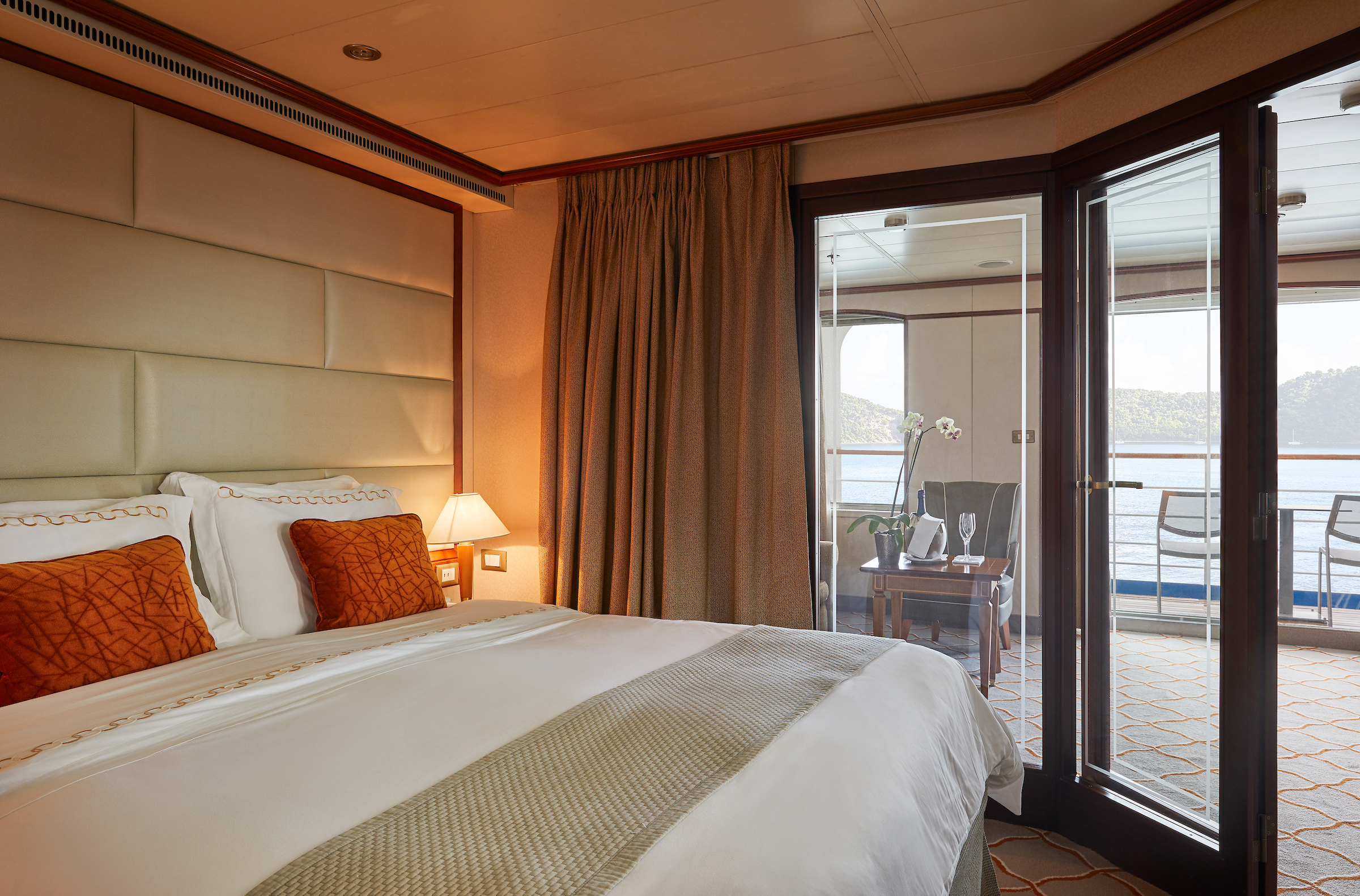
A mark of distinction. Sumptuous. Spacious. Rich textures and panoramic views surround you with distinguished luxury.
An extravagant suite for an extravagant cruise.
One bedroom: 49 sq.m. including veranda
Please note that the 3rd guest will sleep on a comfortable sofa bed in the reception area of the suite.
Essentials
- Deck(s): 7
- Section: Mid-Ship
Characteristics
- Veranda
- Sitting area
- Double vanity
- Separate shower
- Full-size bath
- Walk-in wardrobe with personal safe
Furniture
- Queen size bed
- Writing desk
- Vanity table
- Luxury bed mattresses
Media & Communication
- Unlimited Premium Wi-Fi
- 2 large flat screen TVs with Interactive Media Library
- Sound system with bluetooth connectivity
- Direct dial telephone
- Wall mounted USB-C mobile device chargers
- Dual voltage 110/220 outlets
Onboard Services
- Butler service
- Complimentary laundry, pressing & wet cleaning
- Daily canape service, Welcome chocolate, Welcome fruit stand
- Champagne on arrival
Amenities
- Espresso machine
- Pillow menu
- Refrigerator and bar setup stocked with your preferences
- Plush bathrobe
- Luxury bath amenities
- Umbrella
- Hair Dryer
- Slippers
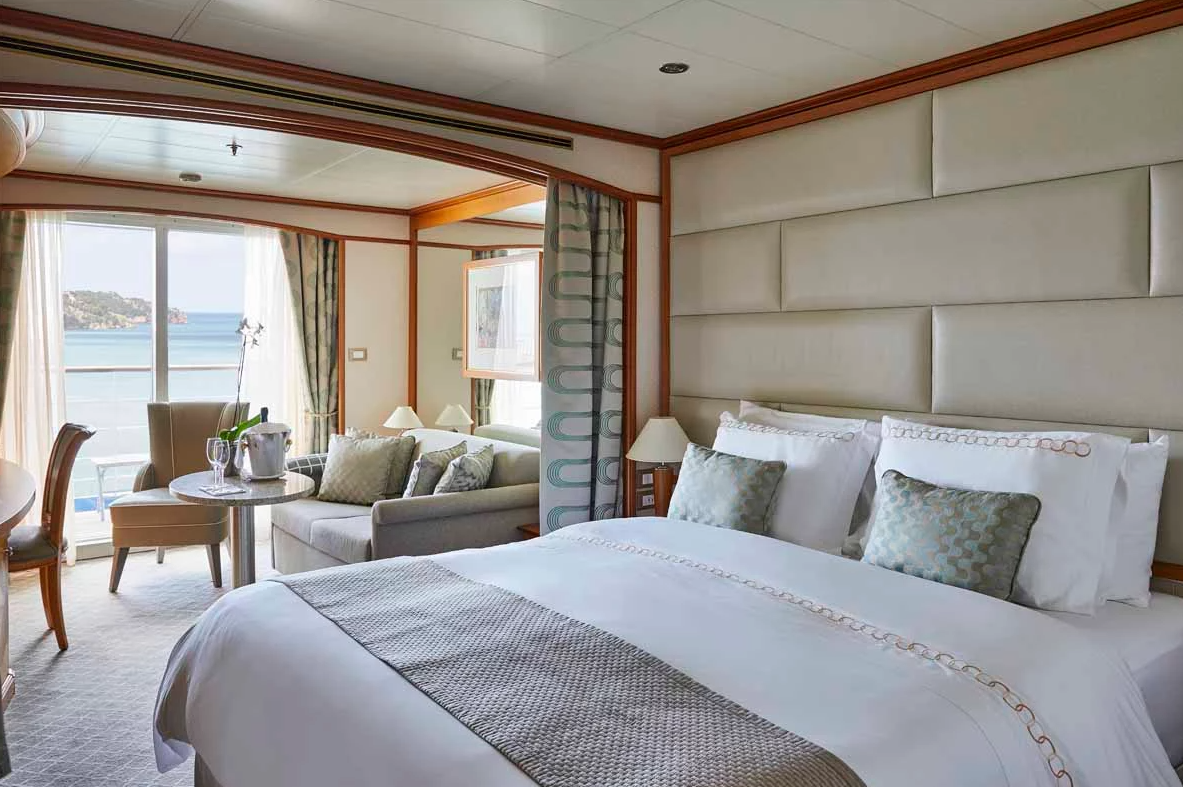
Spacious and immaculate, the Deluxe Veranda is just perfect to for relaxing whether it’s morning, noon or night! A perfect mid-ship location, why not enjoy a pre-dinner drink, breakfast with a view or just enjoy the gentle evening breeze on your private teak veranda? From relaxing in the ultra-luxury marble bathroom to enjoying your best night’s sleep ever, the Deluxe Veranda is the savvy traveller’s choice.
One bedroom: 32 sq.m. including veranda
Please note that the 3rd guest will sleep on a comfortable sofa bed in the reception area of the suite.
Essentials
- Deck(s): 6, 8, 9
- Section: Forward, Mid-Ship
Characteristics
- Veranda
- Sitting area
- Double vanity
- Separate shower
- Full-size bath
- Walk-in wardrobe with personal safe
Furniture
- Queen size bed
- Writing desk
- Vanity table
- Luxury bed mattresses
Media & Communication
- Unlimited Standard Wi-Fi
- 1 large flat screen TV with Interactive Media Library
- Direct dial telephone
- Wall mounted USB-C mobile device chargers
- Dual voltage 110/220 outlets
Onboard Services
- Butler service
- Champagne on arrival
- Amenities
- Pillow menu
- Refrigerator and bar setup stocked with your preferences
- Plush bathrobe
- Luxury bath amenities
- Umbrella
- Hair Dryer
- Slippers

Superior by name and superior by nature! Where do we begin? From beautiful bed linens to sumptuous furniture, our Superior Veranda suites are luxury inside and out! Whether enjoying some down time with the state of the art entertainment system or taking in the most spectacular views from the comfort of your suite veranda, the Superior Veranda is the cosiest home away from home on the high seas.
One bedroom: 32 sq.m. including veranda
Wheelchair accessible suites: 535 and 537
Please note that the 3rd guest will sleep on a comfortable sofa bed in the reception area of the suite.
Essentials
- Deck(s): 5, 6, 7, 8
- Section: Forward, Mid-Ship
Characteristics
- Veranda
- Sitting area
- Double vanity
- Separate shower
- Full-size bath
- Walk-in wardrobe with personal safe
Furniture
- Queen size bed
- Writing desk
- Vanity table
- Luxury bed mattresses
Media & Communication
- Unlimited Standard Wi-Fi
- 1 large flat screen TV with Interactive Media Library
- Direct dial telephone
- Wall mounted USB-C mobile device chargers
- Dual voltage 110/220 outlets
Onboard Services
- Butler service
- Champagne on arrival
Amenities
- Pillow menu
- Refrigerator and bar setup stocked with your preferences
- Plush bathrobe
- Luxury bath amenities
- Umbrella
- Hair Dryer
- Slippers
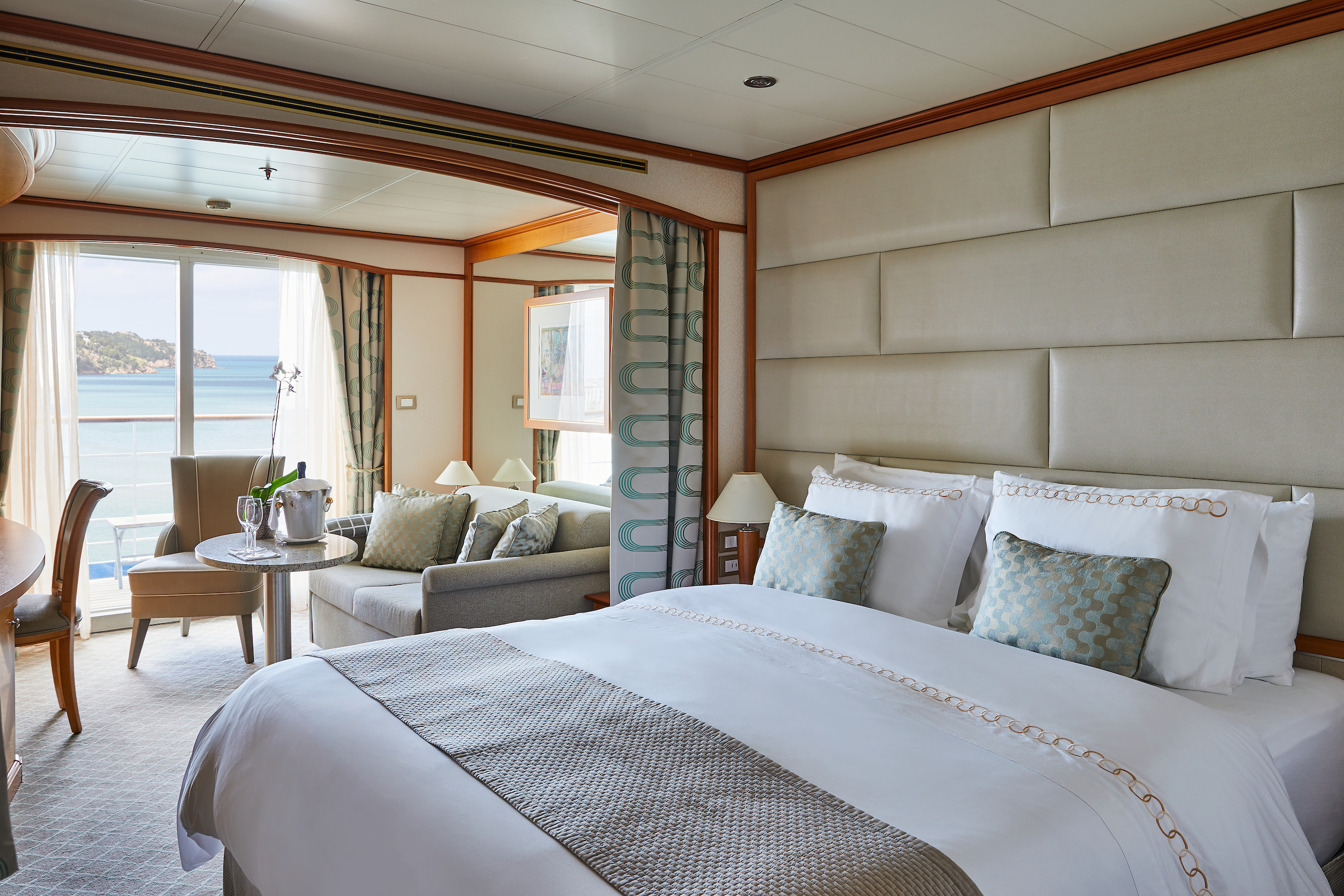
After a busy day of exploring, welcome home to the haven of the Classic Veranda Suite. With butler service, a queen size bed (which can be separated on demand) and beautiful marble bathroom, you won’t want to leave! However, the best part of our Classic Veranda suite is by far the large, private, teak veranda for which the suite is named. Pure bliss.
One bedroom: 32 sq.m. including veranda
Please note that the 3rd guest will sleep on a comfortable sofa bed in the reception area of the suite.
Essentials
- Deck(s): 5, 6
- Section: Forward, Mid-Ship
Characteristics
- Veranda
- Sitting area
- Double vanity
- Separate shower
- Full-size bath
- Walk-in wardrobe with personal safe
Furniture
- Queen size bed
- Writing desk
- Vanity table
- Luxury bed mattresses
Media & Communication
- Unlimited Standard Wi-Fi
- 1 large flat screen TV with Interactive Media Library
- Direct dial telephone
- Wall mounted USB-C mobile device chargers
- Dual voltage 110/220 outlets
Onboard Services
- Butler service
- Champagne on arrival
Amenities
- Pillow menu
- Refrigerator and bar setup stocked with your preferences
- Plush bathrobe
- Luxury bath amenities
- Umbrella
- Hair Dryer
- Slippers
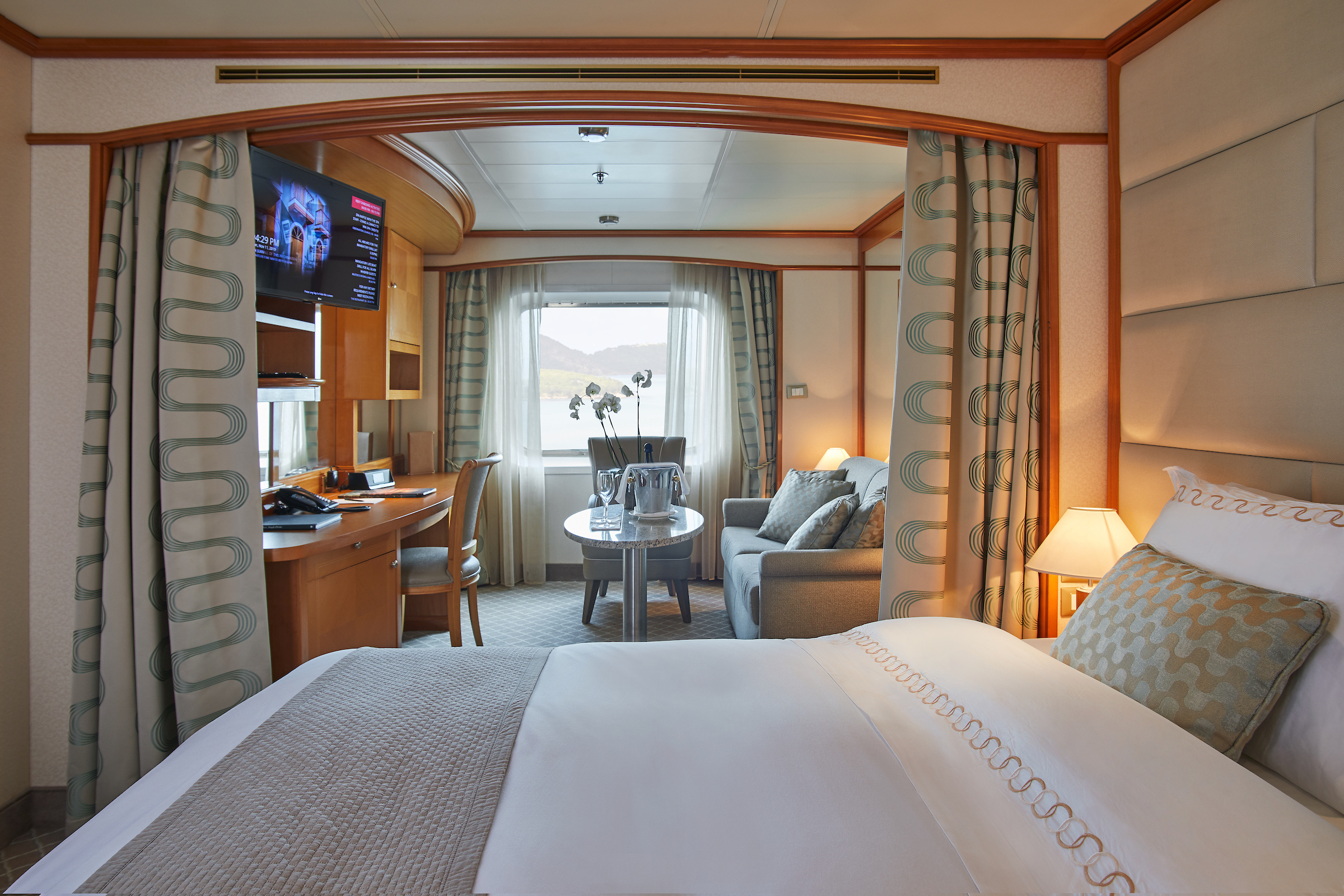
A quiet sanctuary. The sitting area of the Vista suite has plenty of room to relax. Large picture windows frame panoramic ocean views. The perfect backdrop for breakfast in bed during the cruise.
One bedroom: 27 sq.m.
Essentials
- Deck(s): 4, 5
- Section: Forward
Characteristics
- Large Balcony Window
- Sitting area
- Double vanity
- Separate shower
- Full-size bath
- Walk-in wardrobe with personal safe
Furniture
- Queen size bed
- Writing desk
- Vanity table
- Luxury bed mattresses
Media & Communication
- Unlimited Standard Wi-Fi
- 1 large flat screen TV with Interactive Media Library
- Direct dial telephone
- Wall mounted USB-C mobile device chargers
- Dual voltage 110/220 outlets
Onboard Services
- Butler service
- Champagne on arrival
Amenities
- Pillow menu
- Refrigerator and bar setup stocked with your preferences
- Plush bathrobe
- Luxury bath amenities
- Umbrella
- Hair Dryer
- Slippers
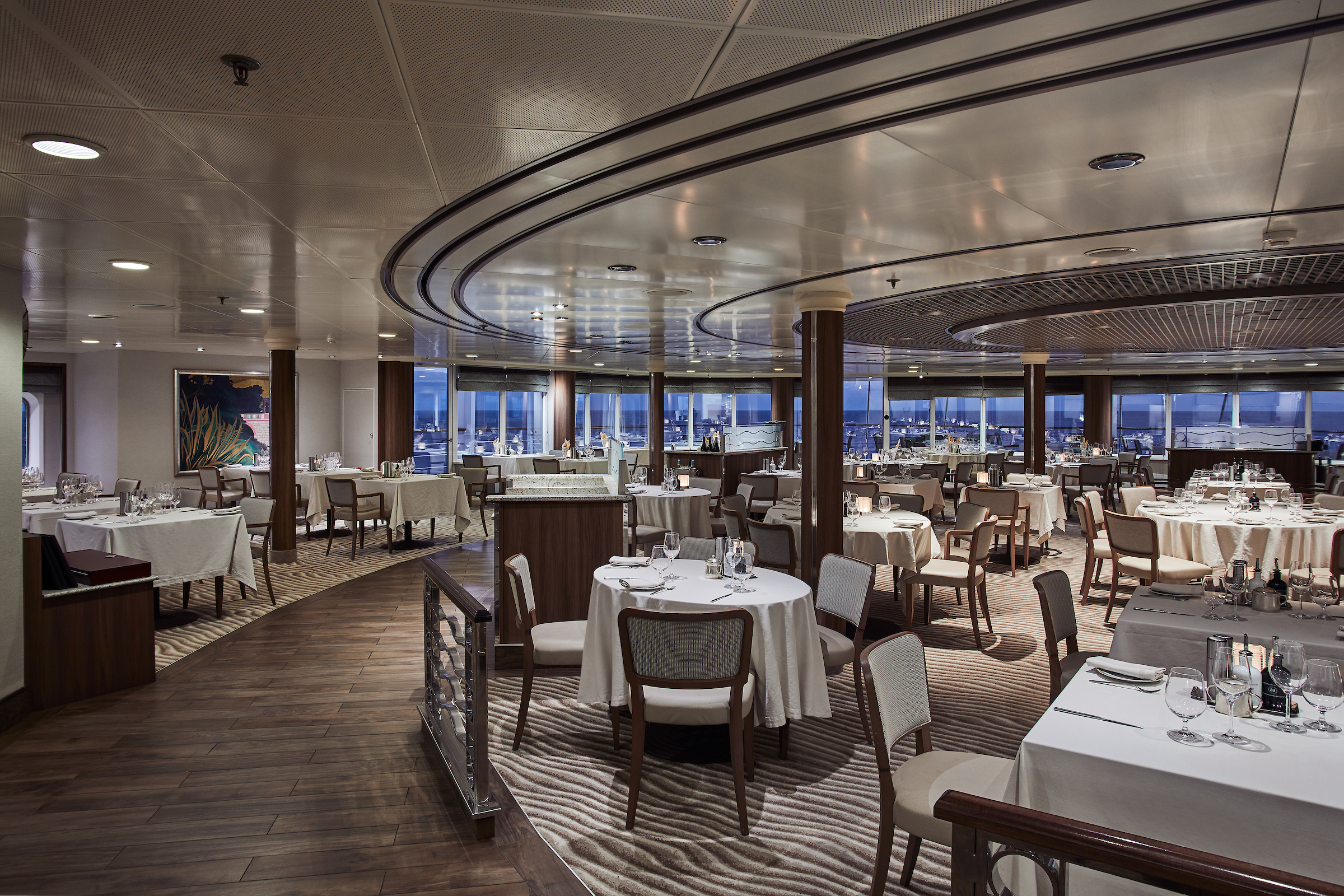
Authentic Italian recipes and the freshest, sustainable ingredients come together in this restaurant at sea.
On board this luxury cruise ship a divine selection of Italy’s best cuisine is served à la carte in La Terrazza. Authentic recipes and the freshest ingredients come together with flair and passion aboard this luxury cruise — a flavourful expression of Silversea’s distinctive Italian heritage. La Terrazza uses buffalo mozzarella from Naples, organic balsamic vinegar and olive oil from Umbria, and air-dried ham out of Parma. The Emilia-Romagna region also produces Silversea’s 24-month aged Parmigiano Reggiano, while the pasta is made daily right on board. La Terrazza is open for casual, buffet-style breakfast and lunch with indoor or al fresco dining on the outdoor terrace. During the evening, La Terrazza transforms into an à la carte traditional Italian restaurant.
Open-seating for breakfast and lunch.
Seating is limited for dinner and reservations are recommended.
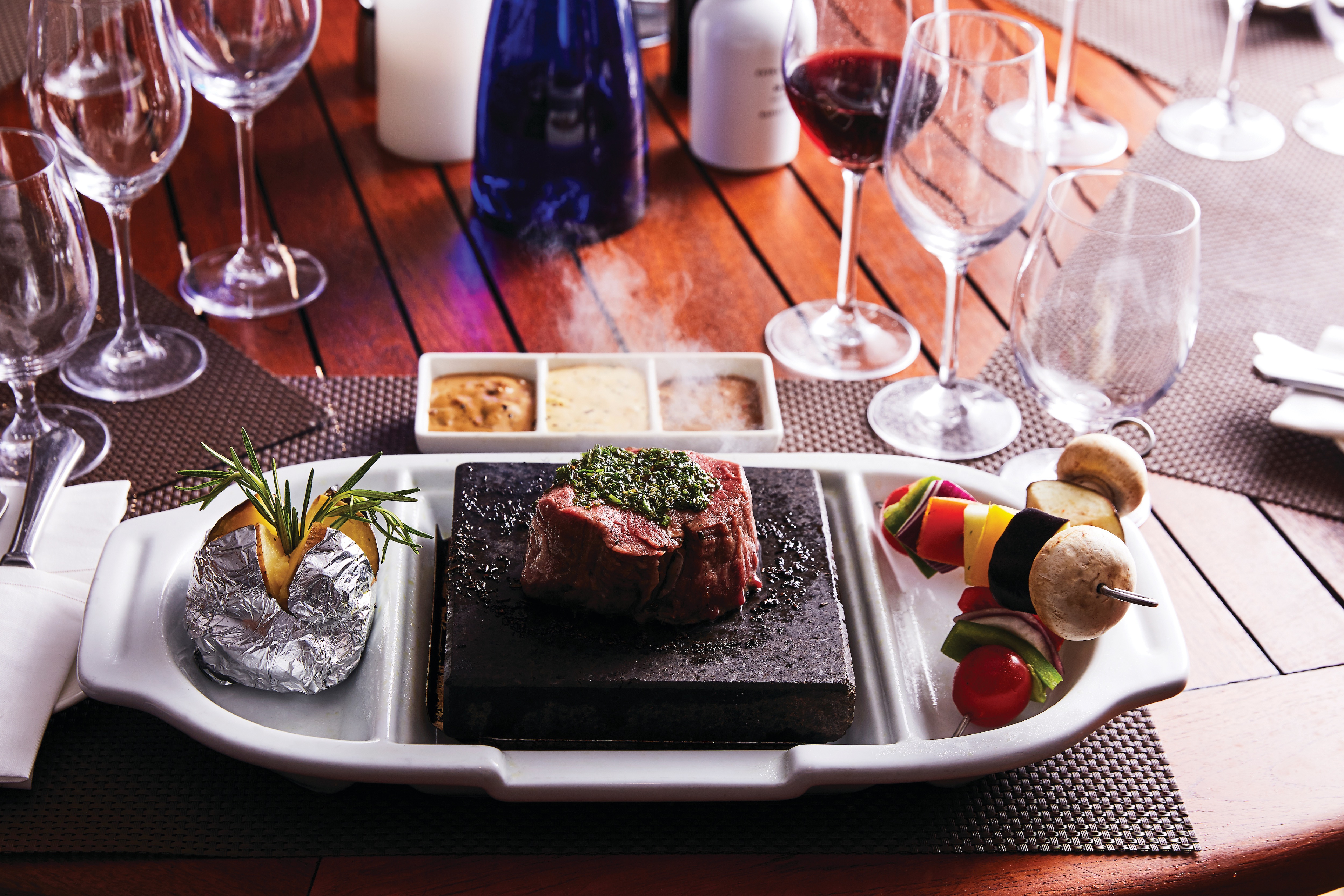
Soft breezes and ocean views beckon at the Grill, especially as the sun goes down when cruise guests gather for cocktails at the outdoor bar and talk about the day’s events.
One of the healthiest cuisines to exist, The Grill features lava stone cooking at its finest. Sourced from volcanic rock and placed in an oven to reach an optimum temperature of 400˚C, The Grill invites guests to cook their food directly at their table. Place your meat, fish or vegetables on top of the grill stone or inside the soup bowl, and then simply cook to your very own taste. Every bite is cooked to perfection, time after time. With the stone cooking available in the evenings only, The Grill becomes a daytime rotisserie and gourmet salad and burger bar, offering build your own burgers from the best selections of meat.
Dress code: Casual
Casual wear consists of pants, blouses or casual dresses for women; open-neck shirts and slacks for men are appropriate
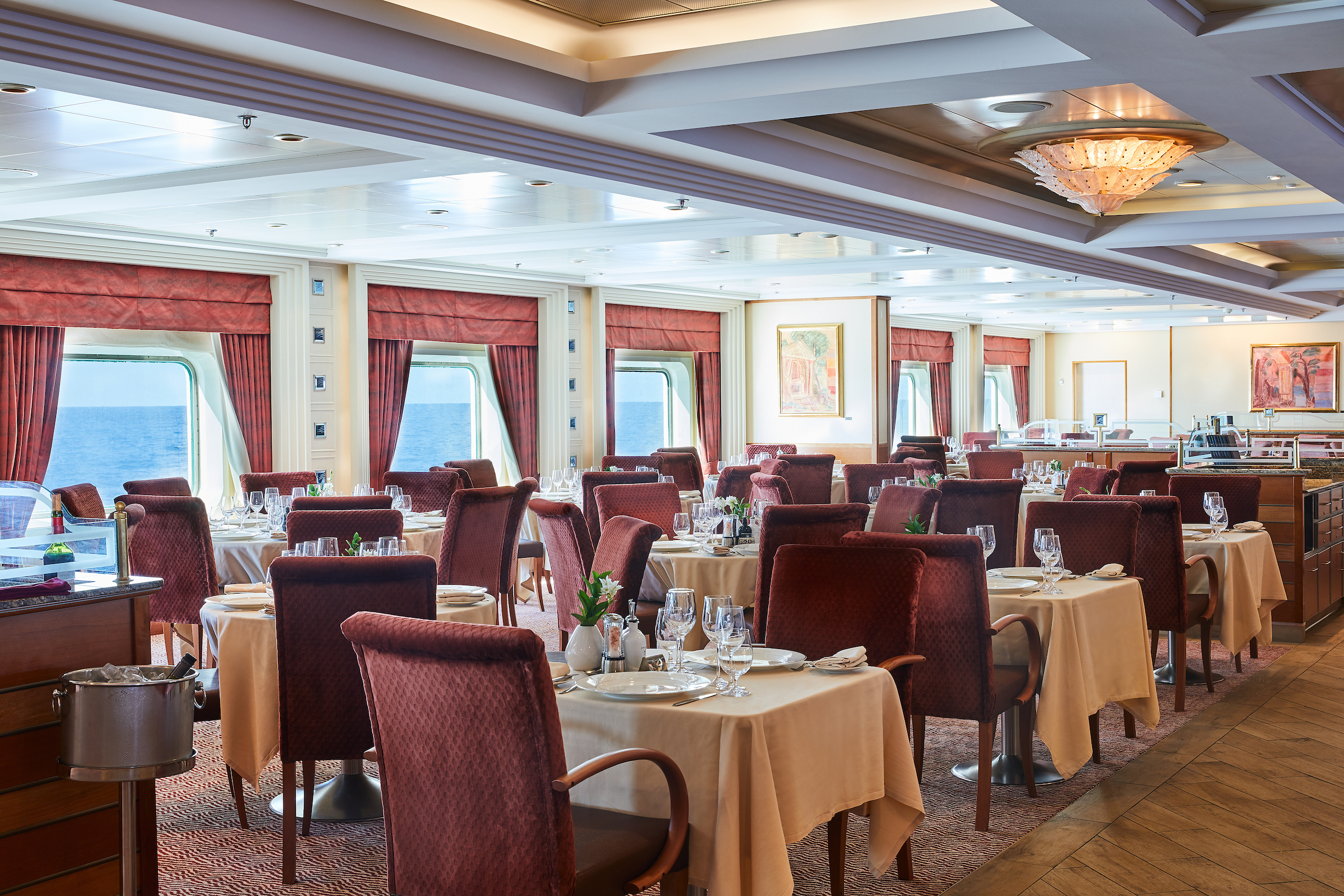
Enjoy Continental and regional specialities, as well as sweeping ocean views in our main dining room.
Sparkling with silver, crystal and candlelight, this luxury cruise ship’s main dining room serves contemporary, international cuisine with sophisticated elegance and impeccable service. Menus feature regional specialities unique to the voyage destination, for example, Roasted Chilean Sea Bass while cruising the Chilean fjords and Indian Chicken Korma en route to Mumbai. The Restaurant on board this luxury cruise ship offers open-seating dining, which means there are no assigned times, no assigned tables. You are free to dine when, where and with whom you please.
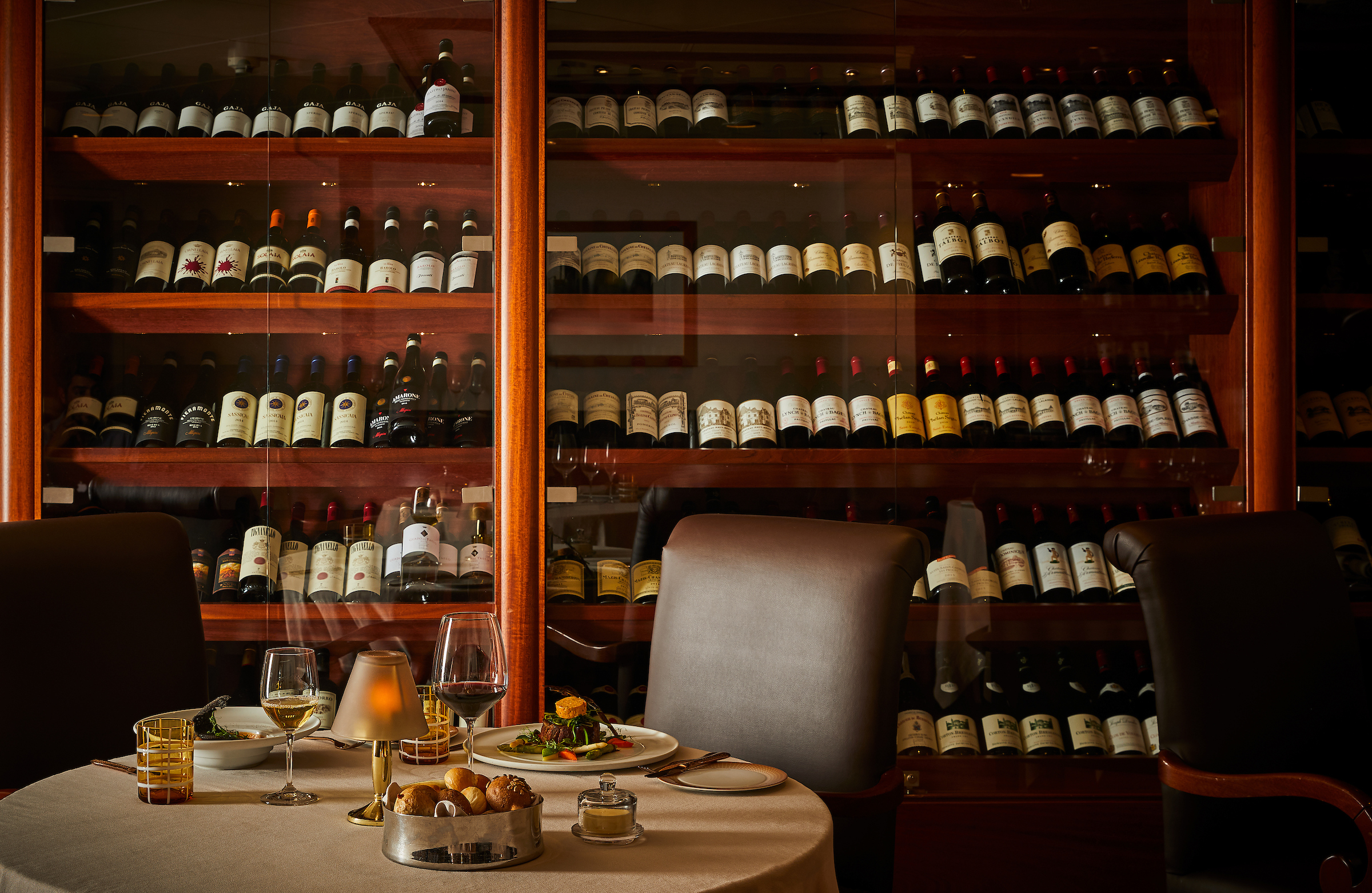
La Dame features a bespoke menu by our top chefs, and is the highest expression of excellence of French dining. The ambience is one of chic contemporary style, with crisp white table linens and the impeccable white gloved service associated with Silversea. Named after “La Dame de Paris” or the Eiffel Tower, La Dame echoes the traditions and cultures embedded in the French gastronomic past, while respecting its bright culinary future. Quintessentially Parisian, extremely elegant and very refined, meals at La Dame are a fusion of tradition and modernity.
Per guest reservation fee of US$60.
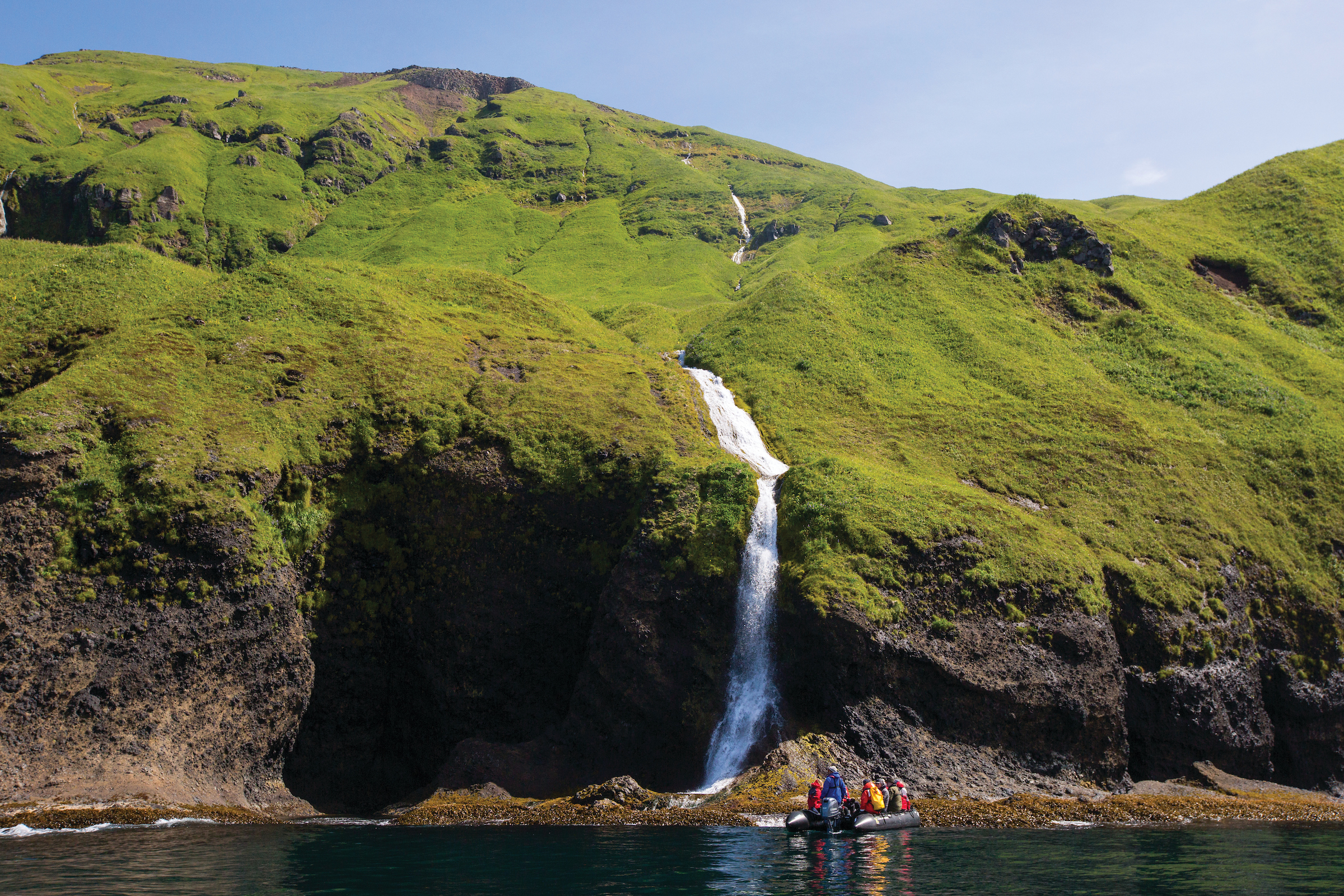
Silversea’s experienced Shore Concierge team are happy to assist, ensuring your shore- side experience is nothing less than a memory that lasts forever. Their knowledge and understanding of ports will truly add to your enjoyment and experience. Detailing history, local flavour, culture, regional customs, shopping tips and much more, they will make sure you get the best of your destination, wherever you are in the world.
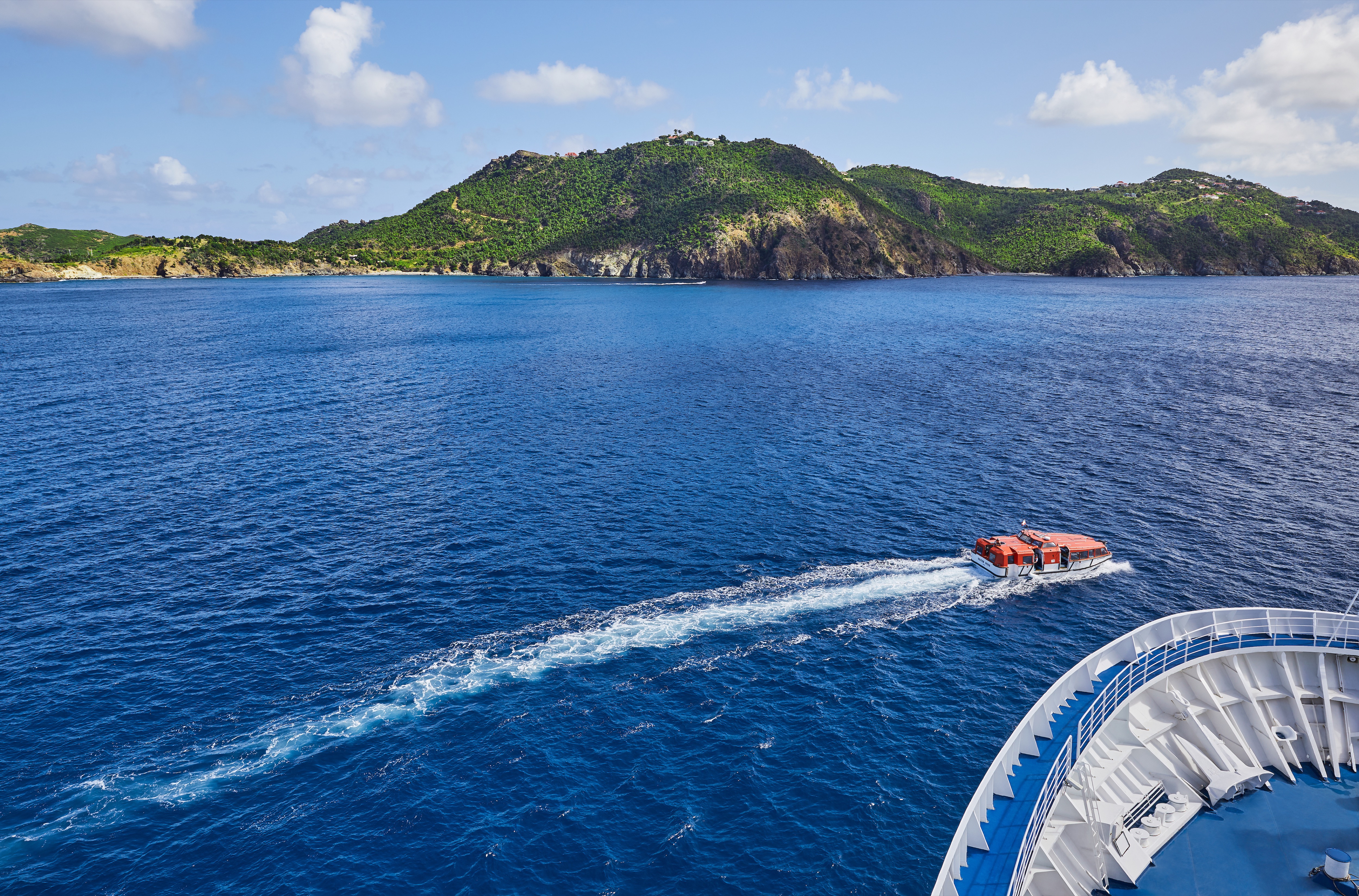
Multiple days at sea mean plenty of R & R for some, but others prefer to drink in all there is to offer on land. Our Mid-Cruise Land Adventures allow you to take full advantage of your time with us without missing a single thing! These short escapades offer an array of adventures, break up your sea days and allow for deeper exploration beyond the coast.
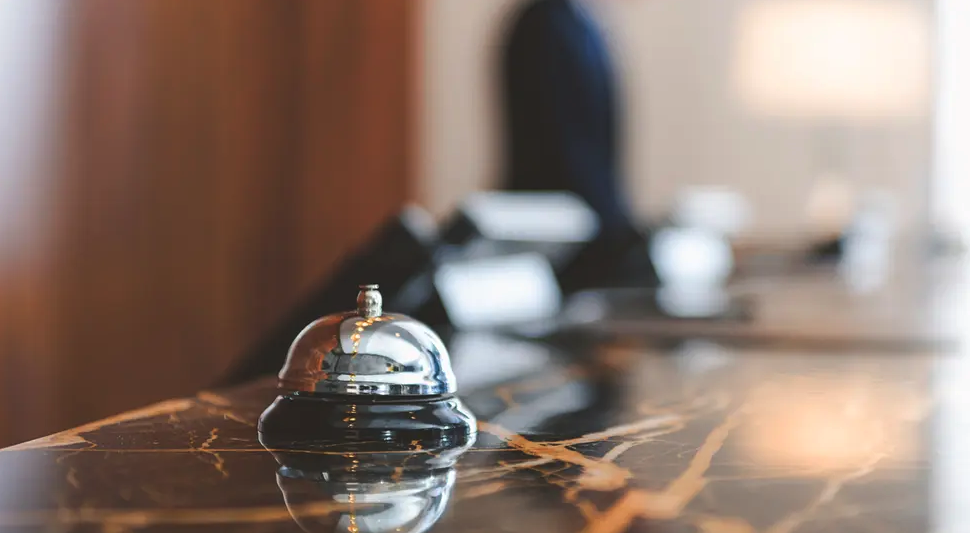
Let Silversea customise a special event or excursion exclusively for you. Expert Shore Excursion professionals are available to assist with all your shorex questions. Make an appointment and gain insider access to knowledgeable suggestions, personalised planning and hassle-free coordination of all private, independent touring, including area highlights, flightseeing, water sports, and much more. Take advantage of this service either in advance of your voyage by email at shoreconcierge@silversea.com or on board by visiting the Silvershore® Concierge desk. Have the Silver Shore Concierge create your tailor-made tour, or be whisked away by private car for a day — the pace and agenda are up to you.
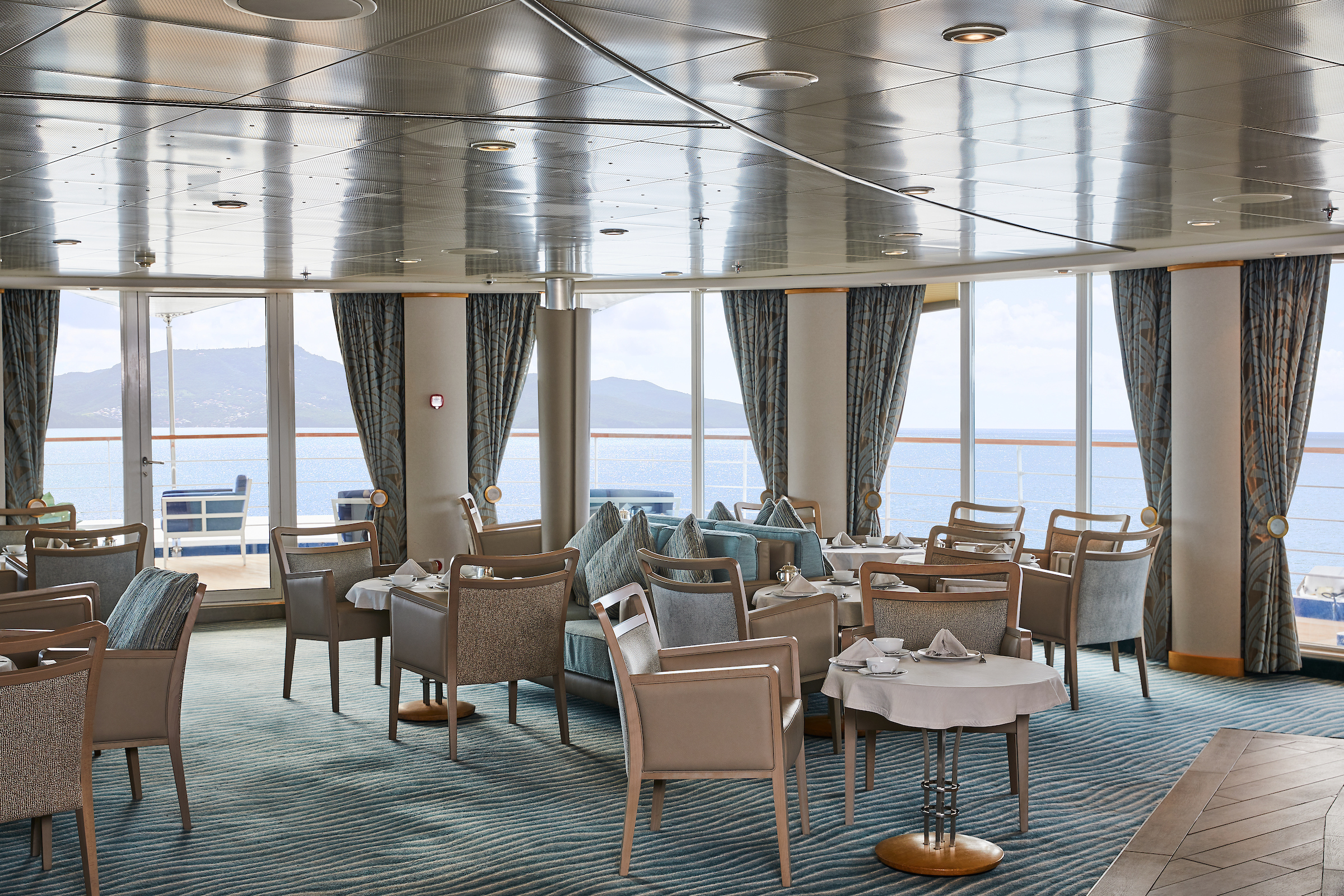
Relax and unwind in the Panorama Lounge, a sophisticated yet amicable space offering beautiful ocean views as you enjoy your cruise.
The Panorama Lounge is specially designed by Silversea to provide an uninterrupted view of the day’s destination from the comfort of the luxury cruise ship’s interior. This is an ideal place to unwind, enjoy afternoon tea, listen to the pianist and watch the setting sun while you cruise. The drinks are complimentary, the music live and inviting. Enjoy dancing to a range of musical styles for every taste from standards to the latest club mixes.
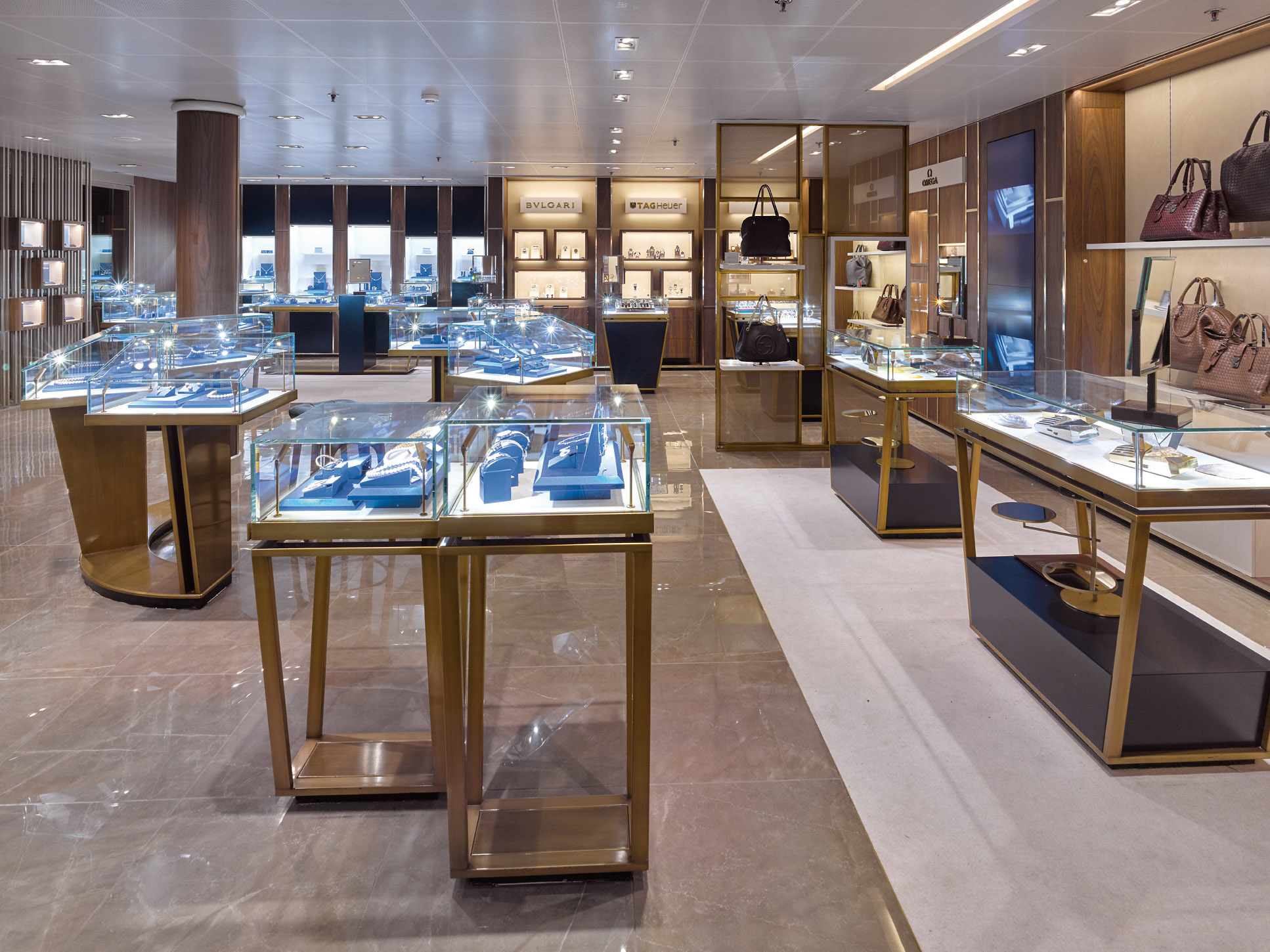
There is a wealth of luxury shopping experiences aboard all Silversea ships, featuring the most distinctive and appealing brands from across the globe.
Exceptional shopping experiences do not end in the cosmopolitan cities we visit. Silversea’s striking new shipboard boutiques, reimagined and redesigned are stunning modern design spaces befitting the finest creations from legendary designers. Carefully selected partners onboard Silversea’s duty-free boutiques offers our guests a carefully curated selection of cutting edge fashions, jewellery, accessories, fine perfumes, cosmetics and Silversea Logo collection all at duty-free prices.
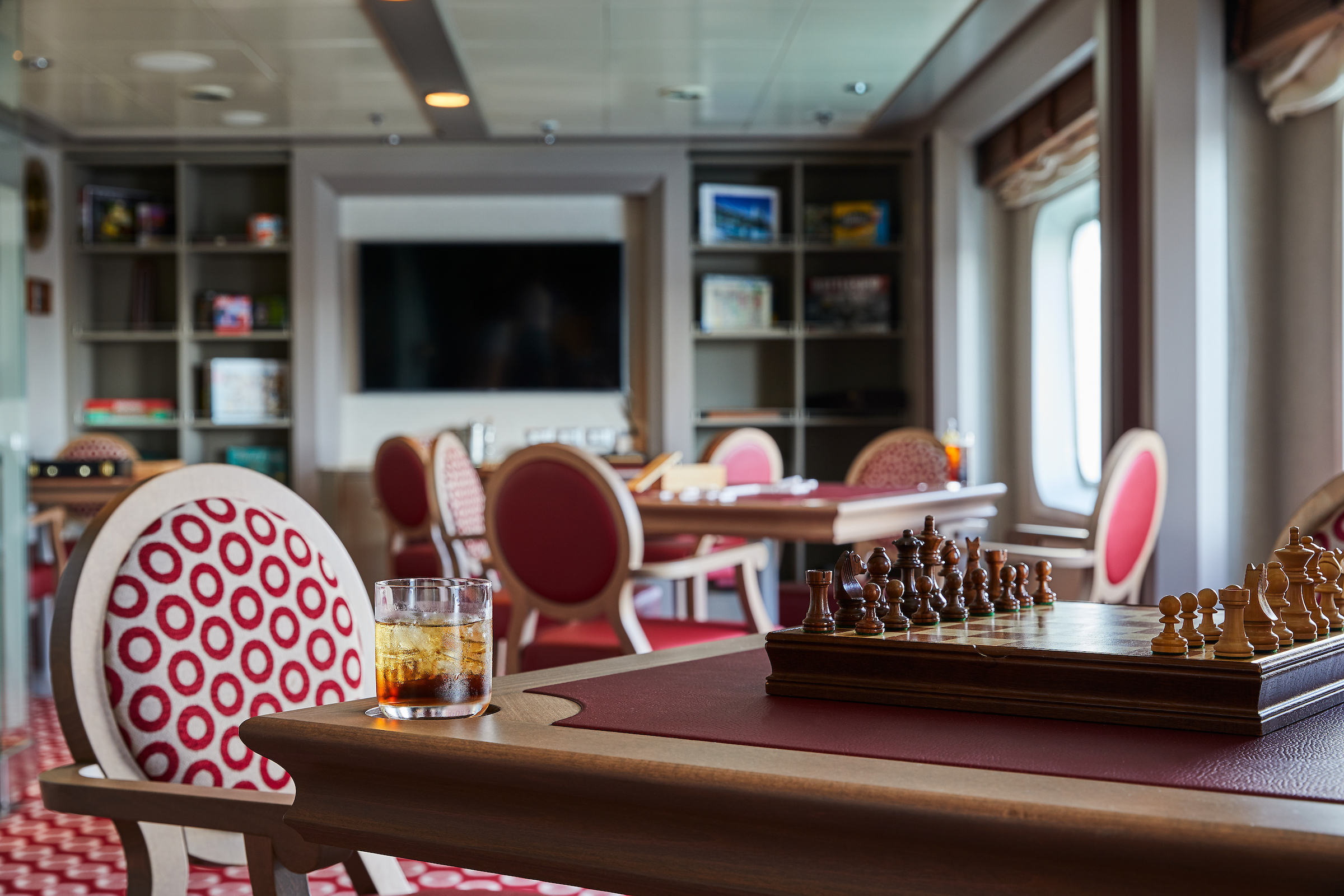
Whether it is for a card tournament or conference, Silversea will provide a dedicated space for the perfect guest experience.
The Card Room on board this luxury cruise ship is where Bridge games and tournaments take place most days. On days at sea, newcomers to the game can learn how to play. Should your group require a conference or meeting space, Silversea is pleased to provide a tailor-made experience. Audio-visual equipment is available and complimentary on our top cruise line.
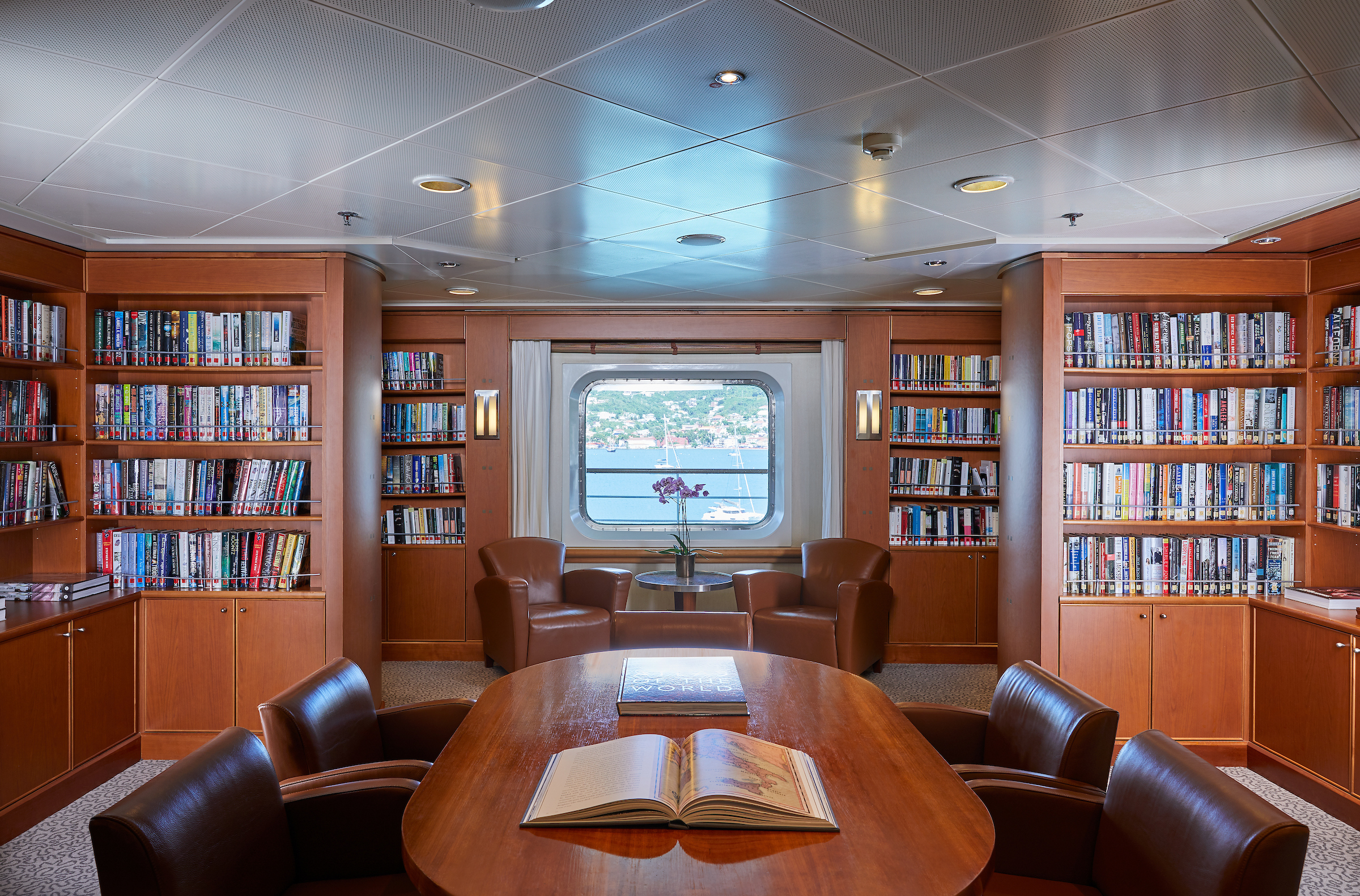
Enjoy a selection of hardcover books, magazines, newspapers, and more during your luxury cruise.
The Library on board this luxury cruise ship has an extensive selection of hardcover books, magazines, reference materials and newspapers, as well as audio listening stations. Movies are also available and can be viewed on your in-suite entertainment centre while you cruise.
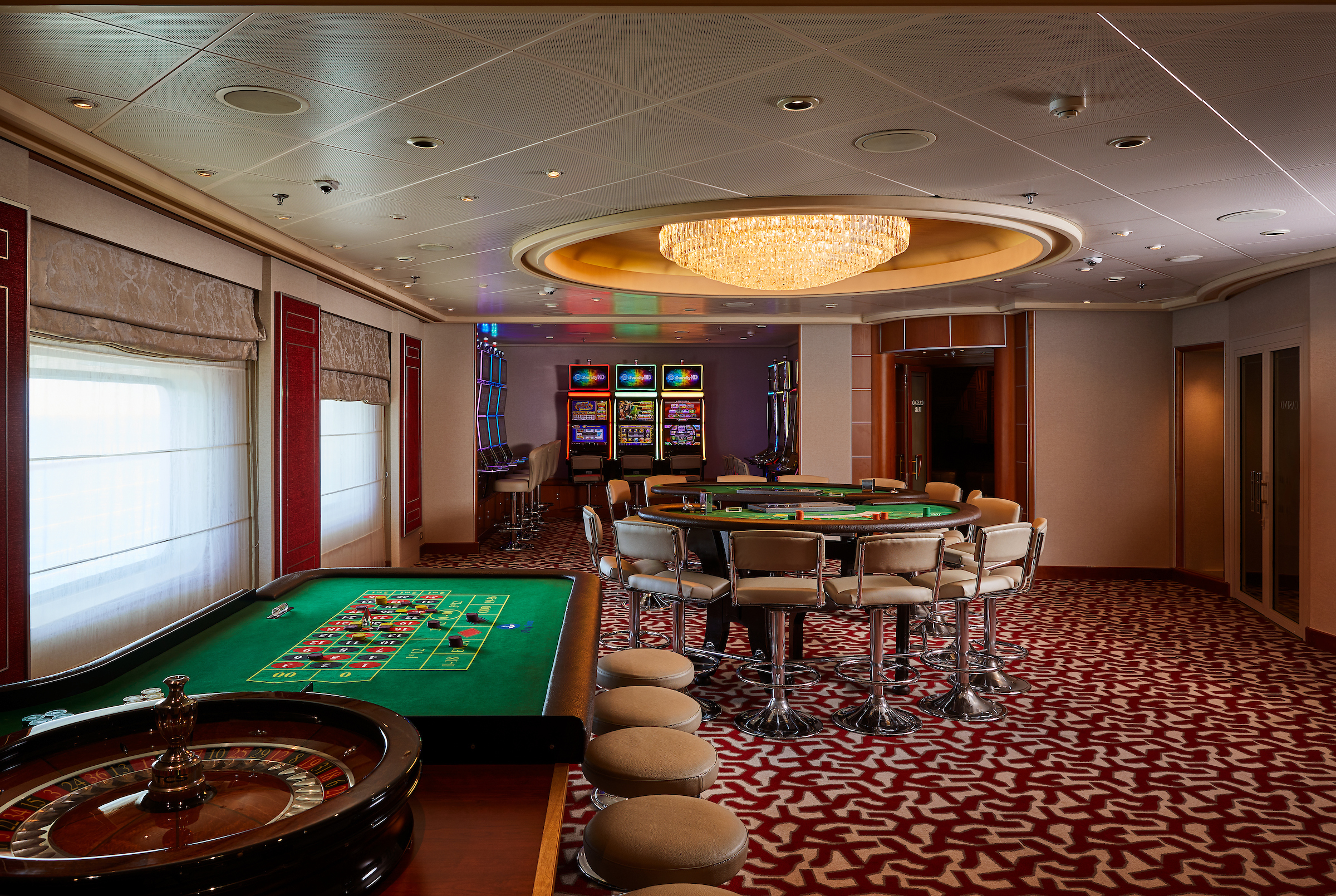
Enjoy a selection of games at the Silversea Casino for guests 18 and older, or discover new games during your luxury cruise.
Roulette, blackjack and slot machines are available while you cruise in The Casino for guests 18 years or older. If you are a novice, come to the champagne reception and learn all the games offered aboard this luxury cruise ship.

Be sure to visit the Reception area, where our experts can provide invaluable information to help you get the most out of your cruise.
This central lobby area of the Silver Whisper welcomes guests to speak with a Guest Relations specialist should they have a question or require any service. Assistance is available 24 hours a day on this luxury cruise ship. For guests wishing to make shoreside arrangements, the Silver Shore Concierge is available to assist with knowledgeable suggestions and personalised coordination of all private, independent touring including sightseeing, water sports, golf and more. The Cruise Consultant can prove indispensable when planning your next Silversea voyage, or should you wish to extend your current voyage for a day, a week, a month… Like having your own personal onboard Silversea professional, the Cruise Consultant will help you to select the perfect voyage, reserve your preferred suite and provide immediate confirmation.
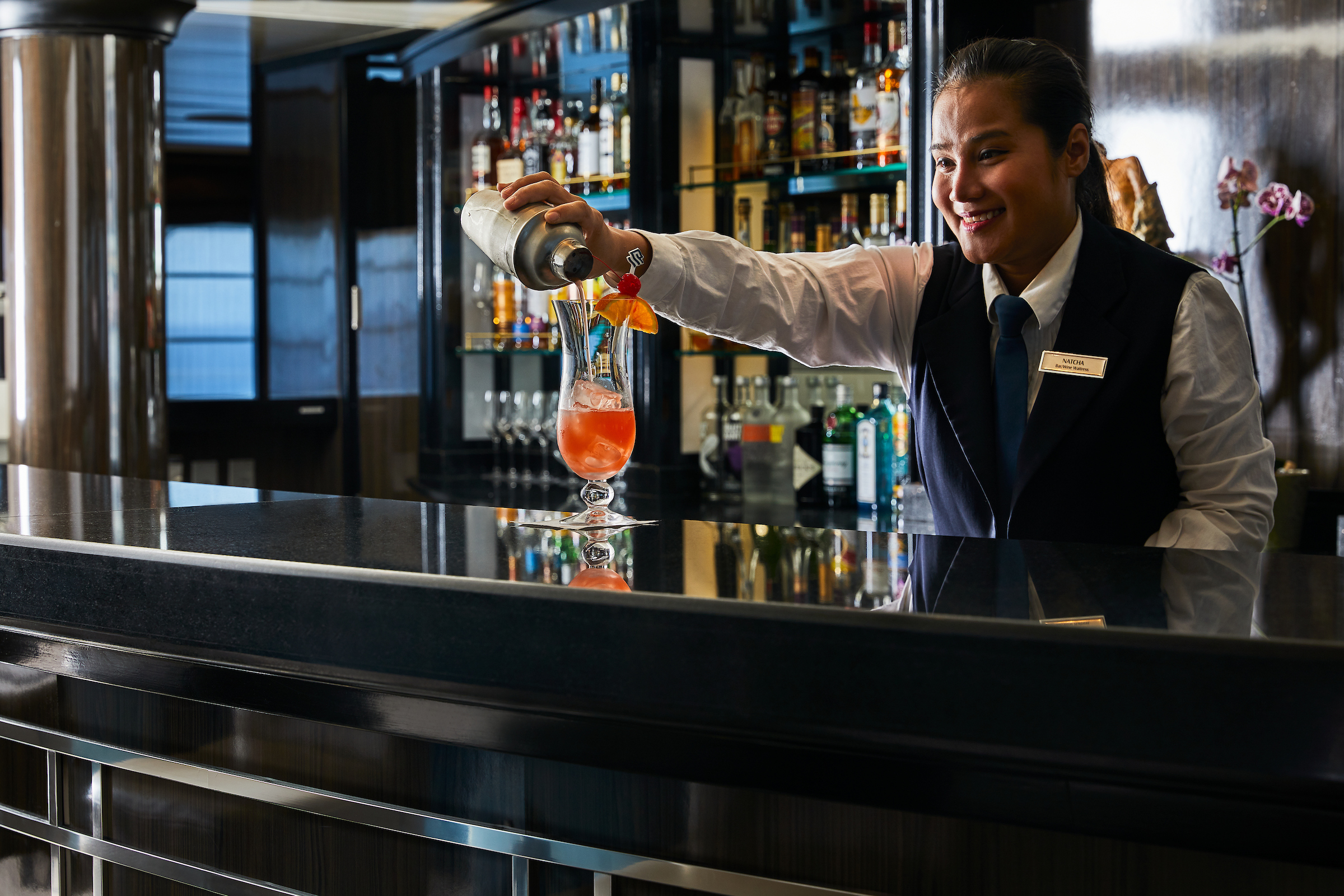
No cruise is complete without meeting new people. Enjoy complimentary drinks and live music at the bar while meeting other guests.
With complimentary cocktails and engaging conversation, live music and a dance floor, Dolce Vita on board this luxury cruise ship welcomes guests to mix and mingle while they cruise to their destination.
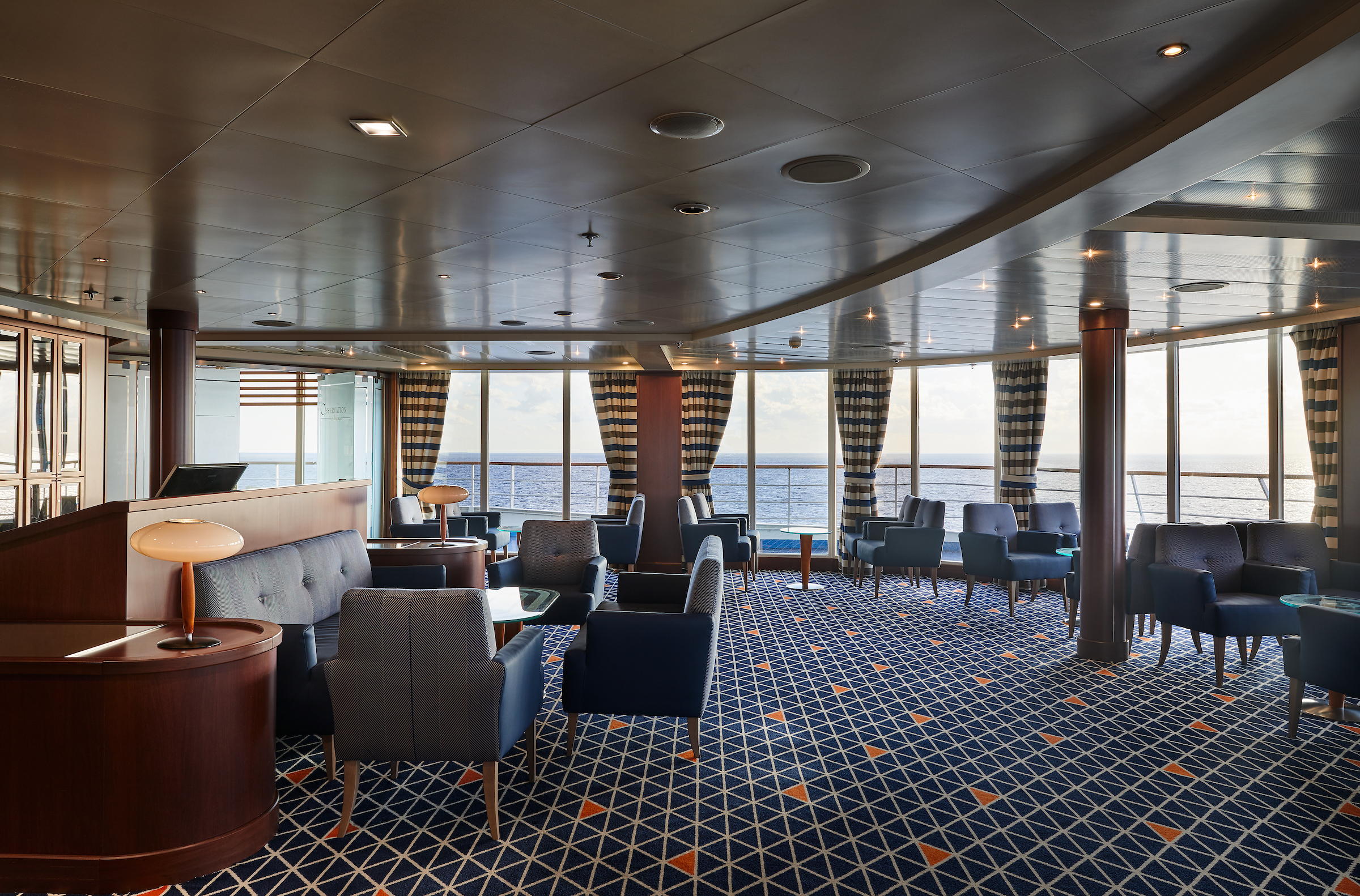
Set on the highest level at the very top of the ship, this is a quiet space for reading and reflection while being dazzled by the undulating seascapes that are constituent to life on board.
The eponymous lounge carries its name well. Set on the highest level at the very top of the ship, this is a quiet space for reading and reflection while being dazzled by the undulating seascapes that are constituent to life on board. Borrow a book from the in-house library, read the papers or just embrace the tranquillity of being at sea.
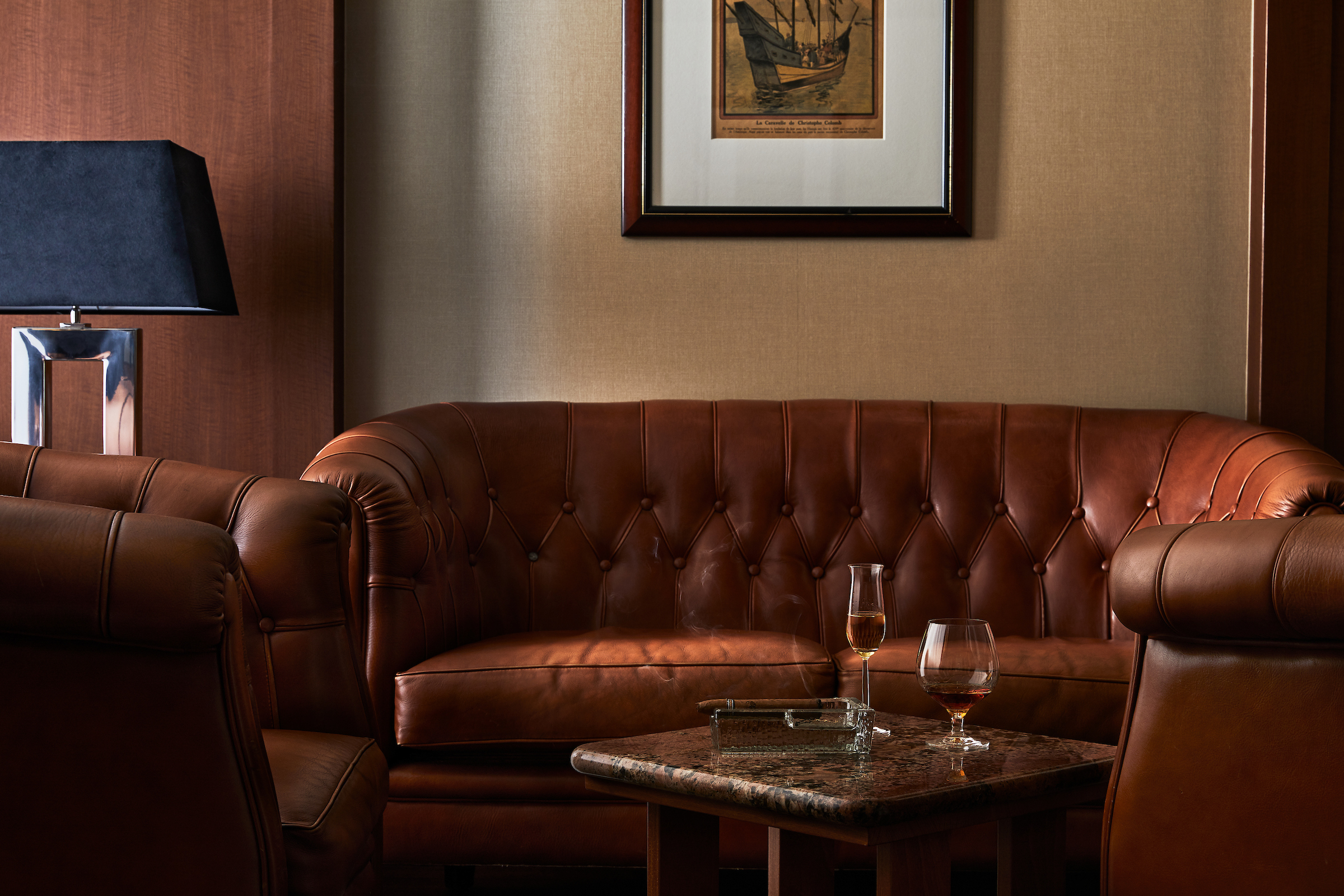
If you appreciate good cognac or premium cigars, be sure to visit the Connoisseur’s Corner to see the ship’s exceptional selection.
The Connoisseur’s Corner of this luxury cruise offers exceptional cognacs along with a premium selection of cigars for purchase.
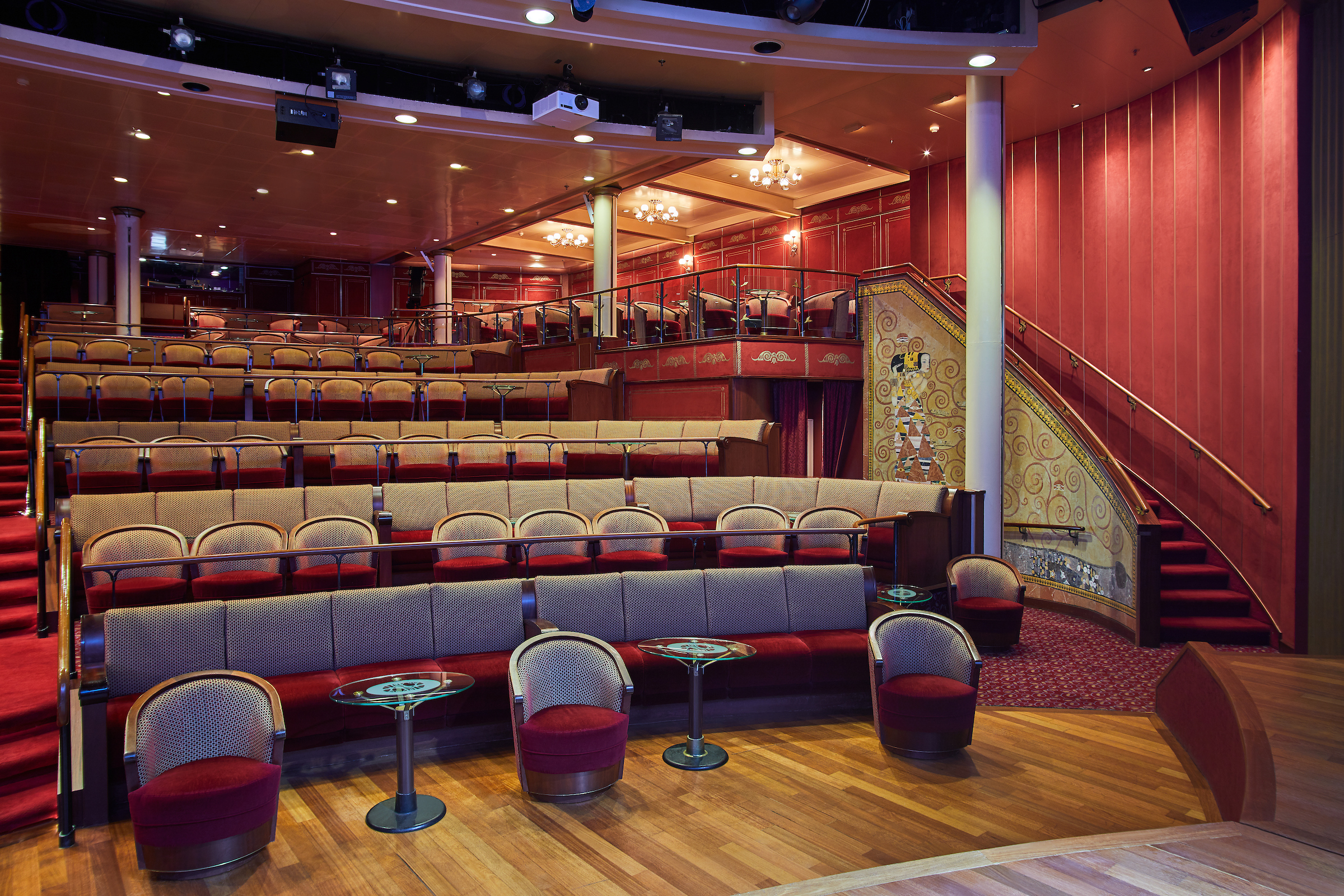
Applaud a broad spectrum of entertainment — from full-scale production shows and classical soloists, to cultural entertainment and feature films.
Every seat in this luxury cruise ship’s multi-tiered venue enjoys a clear view to the stage. Applaud a broad spectrum of entertainment brought to the Silver Whisper — from full-scale production shows and classical soloists, to cultural entertainment and feature films. Throughout your voyage, The Show Lounge also presents port talks, enrichment lectures and a variety of special events throughout the cruise.
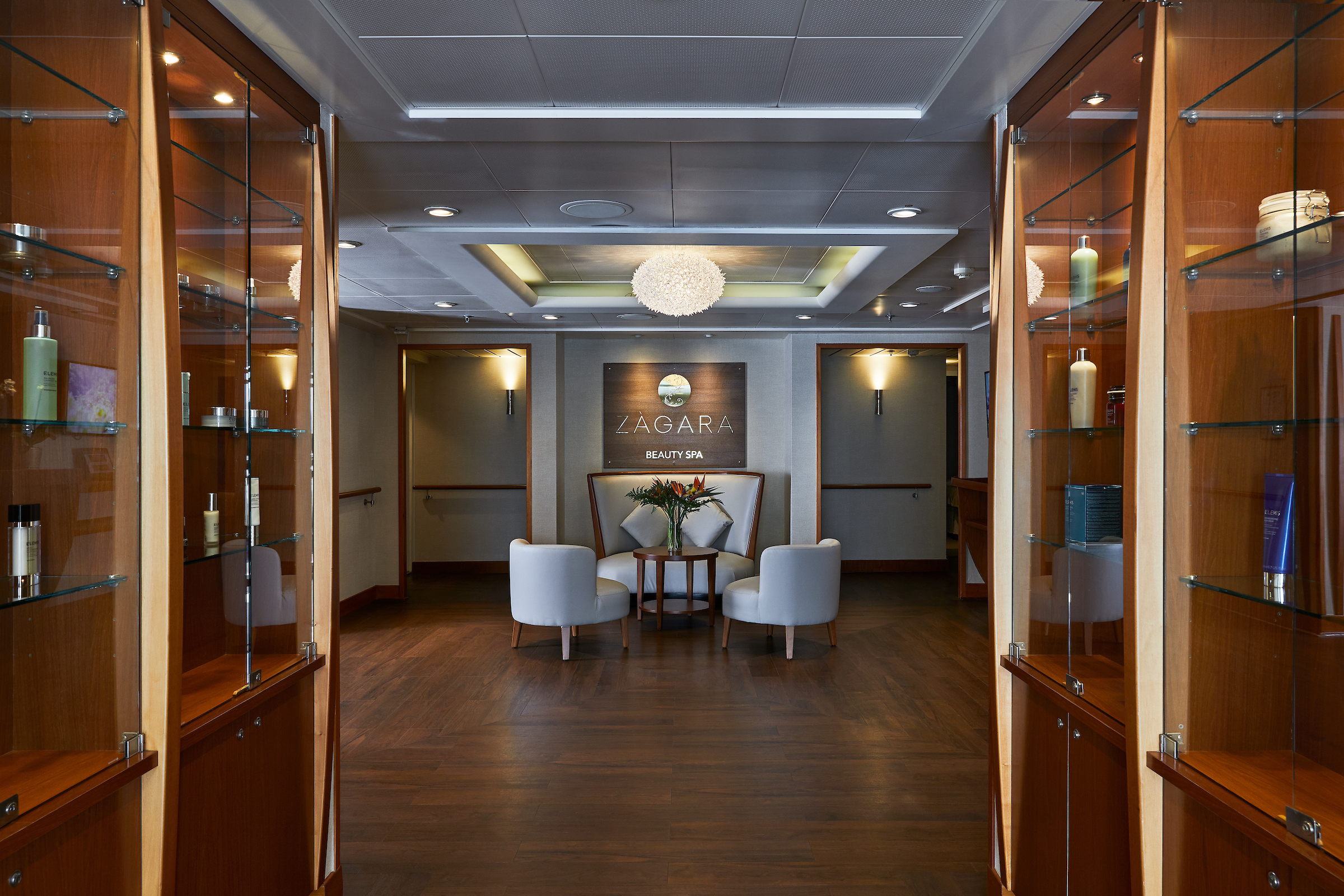
Come and indulge in a luxurious spa treatment. Facials, body wraps, massages: the spa is the perfect place to unwind.
Relax your body and mind in this luxury cruise ship’s soothing sanctuary. Indulge in a wide range of invigorating therapies at the spa, including facials, body wraps and massages. Appointments for these services may be made on board the ship, or in advance via My Silversea. Men’s and women’s saunas and steam rooms are perfect for relaxing before your luxury spa treatment or after your workout.
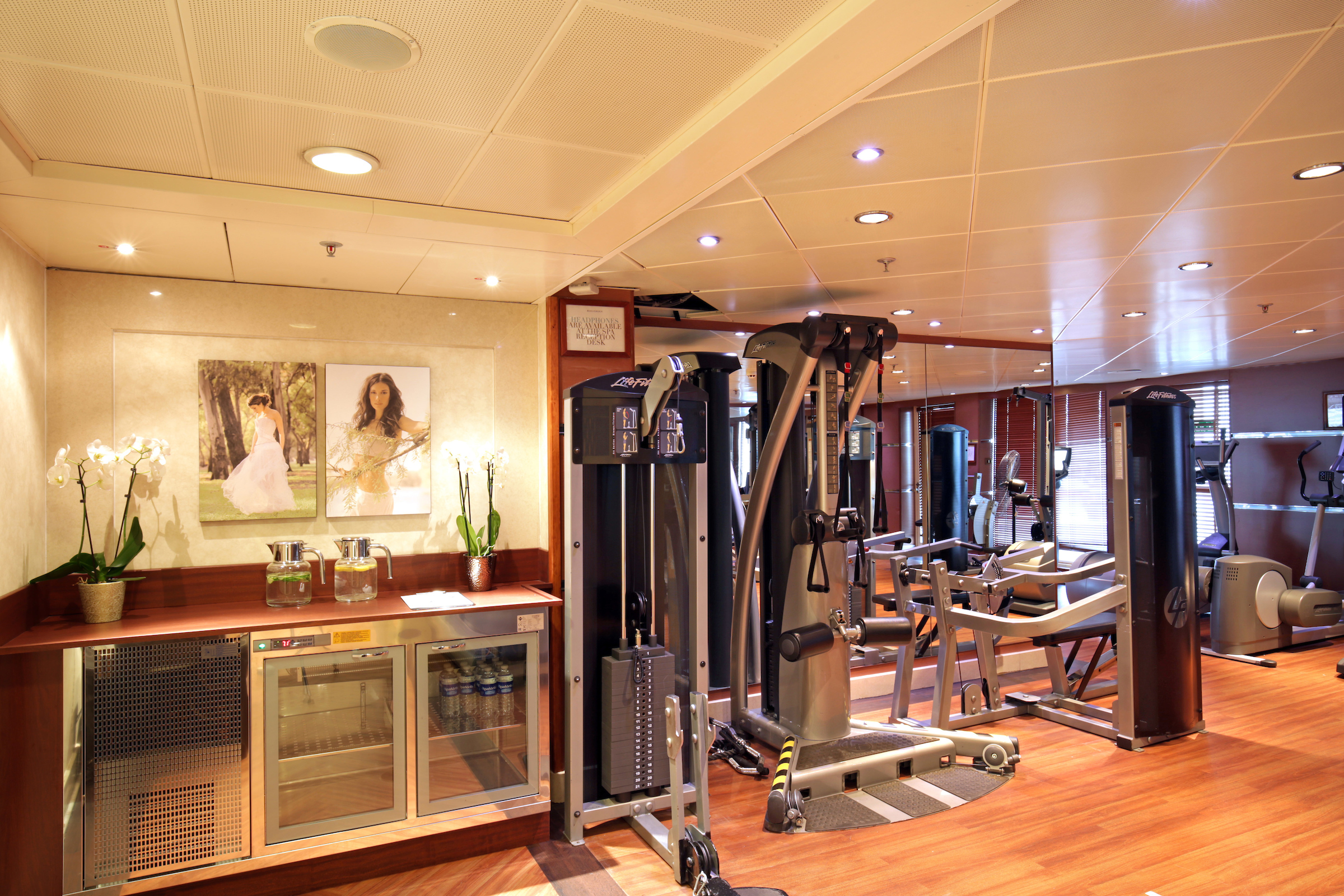
The Fitness Centre offers world-class equipment, classes, and personalised services.
The Fitness Centre on board this luxury cruise ship is equipped with free weights, weight machines, state-of-the-art treadmills, elliptical trainers and recumbent and upright bicycles. Classes in aerobics, yoga, Pilates and circuit training are led by the onboard fitness trainer and are always complimentary on Silversea’s best cruise line. Personal training, body composition analysis and specialty classes are available at an additional charge.
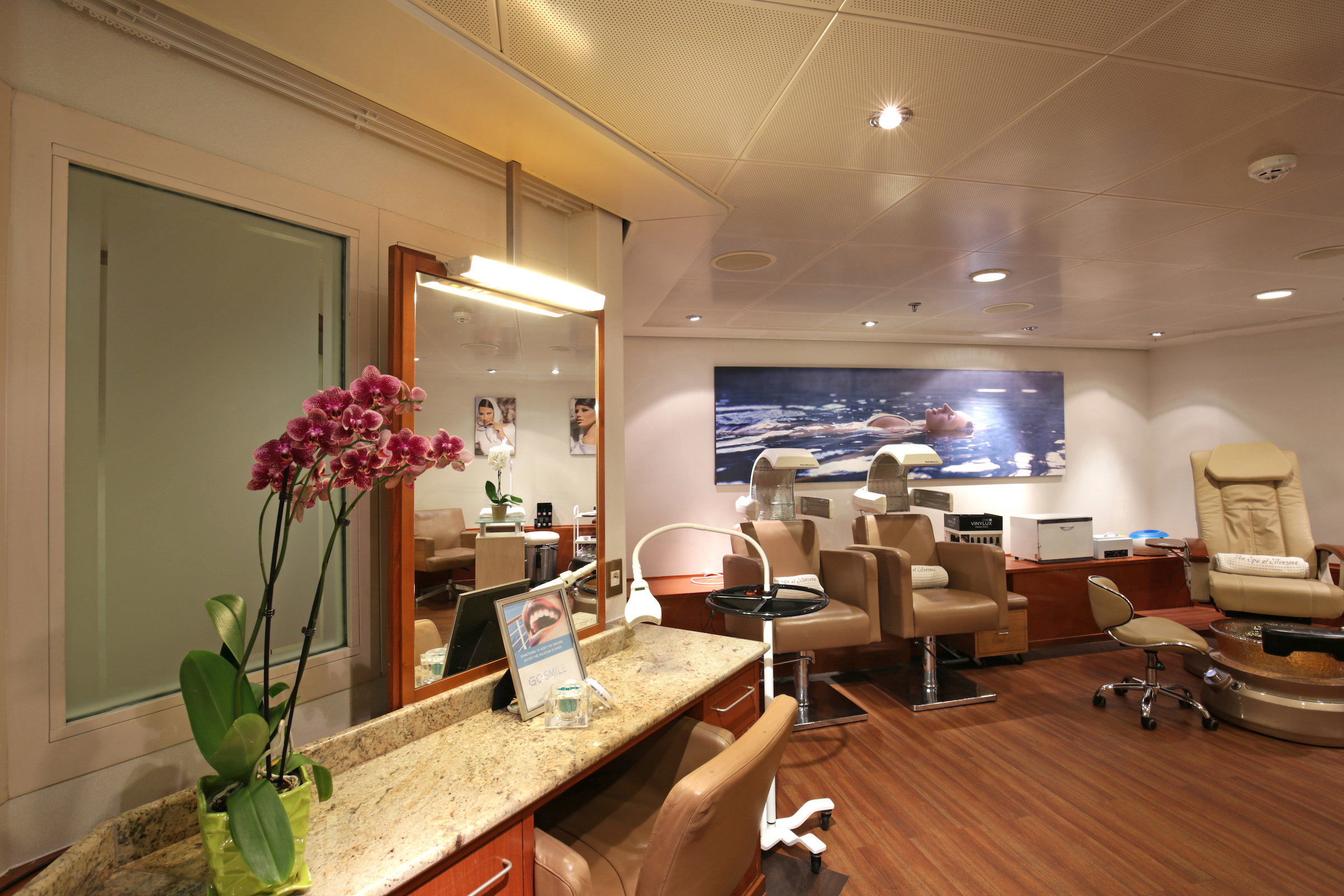
Maintain your fresh look throughout your luxury cruise at the Zagara Beauty Salon. Services are available for men and women.
A full range of salon services including hairstyling, manicures and pedicures, is available on board this luxury cruise ship for both men and women. Appointments for these chargeable services may be made on board the ship, or in advance via My Silversea. Maintain the look of prestige travel while you cruise.
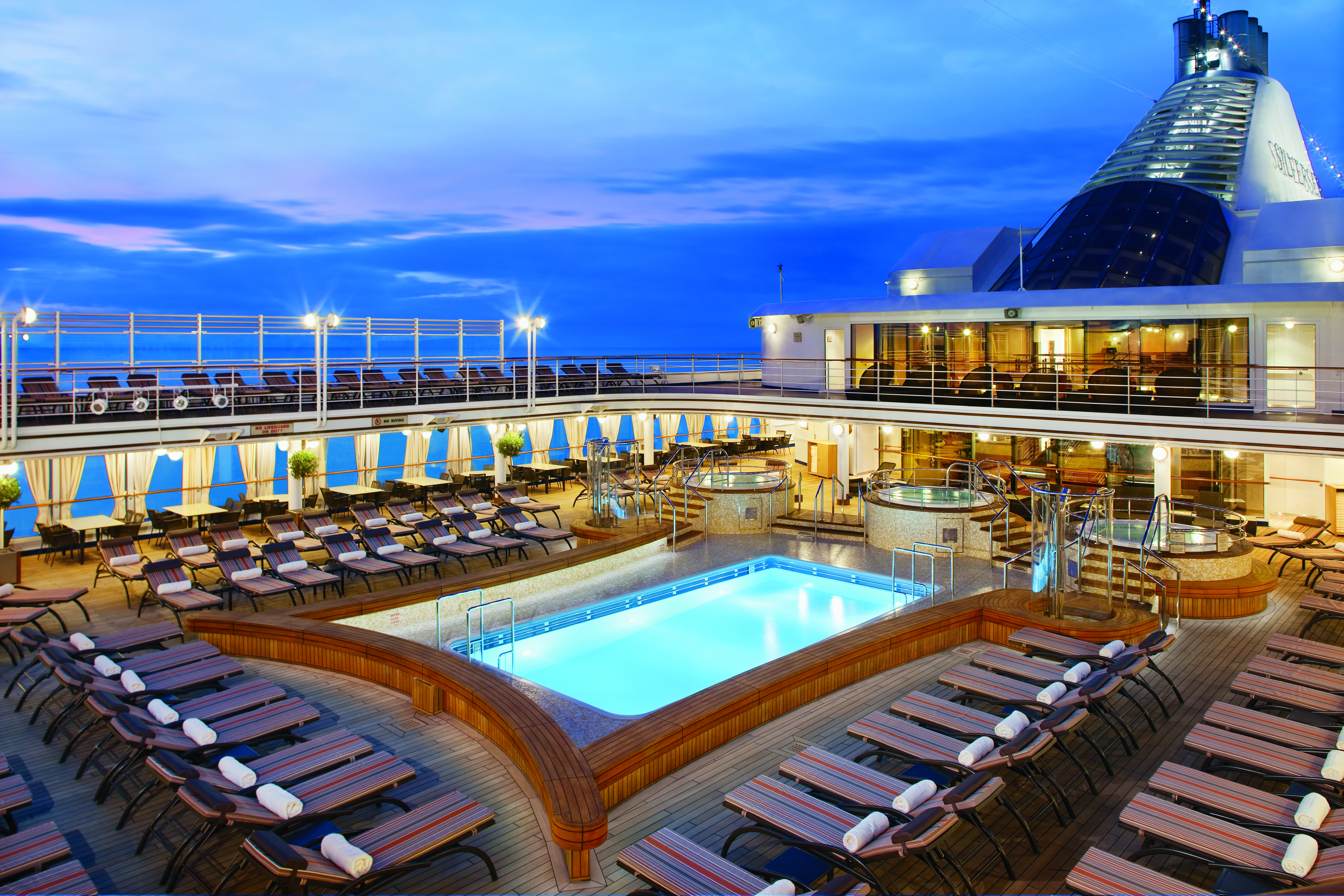
Chaise lounges arranged in the sun or shade. Bubbling whirlpools. The pool water refreshing in warmer climates, heated for cooler weather. The attentive staff at the ready with an oversized towel as you emerge from the pool, with your favourite beverage at just the right moment. The luxury cruise ship of your dreams.
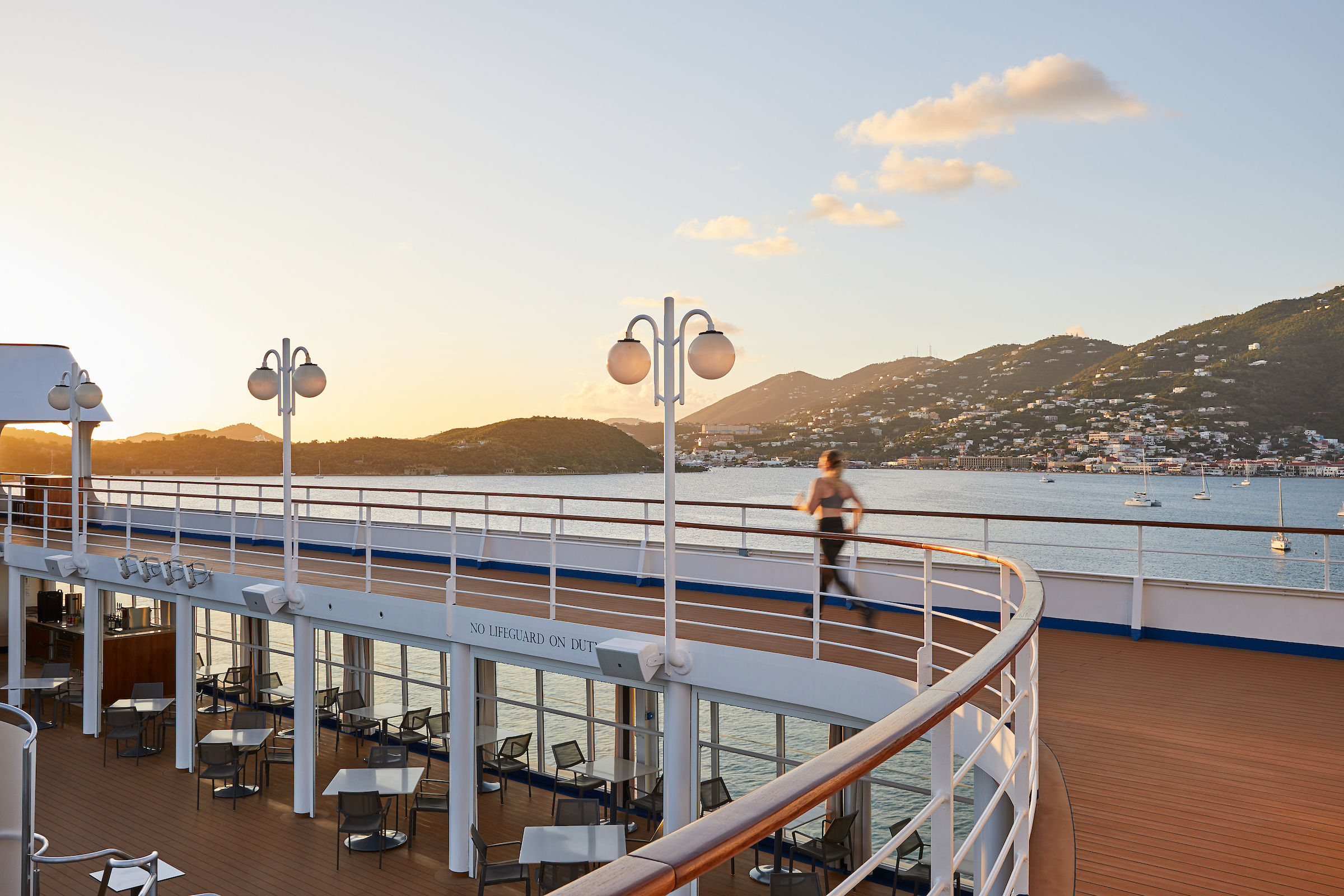
A jogging track is available for guests, running the entire outside edge of the deck.
For Silversea Expeditions guests, casual resort wear is appropriate at all times when on board, with the exception of two evenings when Informal attire is required. For men, this means a jacket, tie optional.
At Silversea, the comfort, enjoyment and safety of all guests is paramount. To ensure a pleasant and safe environment, smoking is prohibited in most public areas, guest suites or suite balconies. However, cigarette, e-cigarette, cigar, pipe and vaporizer smoking is permitted in the Connoisseur’s Corner both indoors and outdoors (where applicable). In addition, cigarette, e-cigarette and vaporizer smoking is permitted in specifically designated outside areas and tables:
- Silver Nova, Silver Ray: Dusk Bar (port side);
- Silver Muse, Silver Spirit: Panorama Lounge (port side) and Pool Grill (port side);
- Silver Moon, Silver Dawn: Panorama Lounge (starboard side) and Pool Grill (port side);
- Silver Shadow, Silver Whisper: Panorama Lounge (starboard side) and Pool Grill (starboard side);
- Silver Cloud, Silver Wind: Panorama Lounge (port side) and Pool Grill (port side);
- Silver Origin: on open deck 4 aft;
Silversea kindly requests that all guests observe the non-smoking areas.
Wheelchair guests must bring their own collapsible wheelchair. Please note that not all shore excursions are suitable for guests with impaired mobility. Silversea strongly recommends wheelchair guests travel with someone who is able to assist them both ashore and at sea as Silversea may be unable to offer special assistance. Please note that wheel-on and/or wheel-off access may not be available at some ports-of-call. Silversea reserves the right to deny boarding to any guest who failed to notify Silversea of such requirement at the time of booking.
All guests are required to report in writing to Silversea at the time their reservation is made:
- Any physical or mental condition that may require medical or professional treatment or attention during the voyage
- Any condition that may render the guest unfit for travel, or that may require special care or assistance
- Any condition that may pose a risk or danger to the guest or anyone else on board the ship
- Any condition that may require oxygen for medical reasons
- Any intention or need to use a wheelchair aboard ship.
If you have special dietary requirements, Silversea will make every attempt to accommodate your requests. Please advise Silversea of your needs on the Guest Information Form at least 75 days prior to sailing. Notification should be sent to specialservices@silversea.com
Each Silversea ship is equipped with a Medical Centre, which is staffed by a doctor and nurse on 24-hour call when at sea. When docked, supplementary emergency care may also be obtained through local medical facilities. Guests may be charged for medical services and for medications used for their medical treatment. The Medical Centre is not intended or designed to provide on-going treatment of pre-existing conditions or for extended critical care, and Silversea is not responsible for the diagnosis, treatment or services furnished by shipboard medical personnel.
Silversea cruise guidelines state that children under the age of 18 must be accompanied, in the same or connecting suite, by a parent or other responsible adult over the age of 21 for the duration of the voyage. If the adult accompanying the minor is not their parent, a parental consent guardianship form must be signed by a parent or legal guardian and received by Silversea prior to sailing. Please contact our Special Services Department at SpecialServices@Silversea.com for a Parental Consent Form. Guests must be 21 years of age or older to purchase or consume alcohol. Silversea reserves the right to refuse to serve anyone who in its sole judgment may be under the influence of alcohol, or for any reason necessary in its judgement to preserve the health and safety of guests and employees.
Silversea cannot accommodate infants less than six months of age and reserves the right to limit the number of children less than three years of age (Silver Explorer, Silver Cloud and Silver Wind cannot accommodate infants under the age of 1 year, Silver Origin cannot accommodate children under the age of 5 years). Parents are required to sign a notarised waiver prior to sailing in order to grant a valid booking for children ages between 6 months and 1 year old. A signed and notarised waiver will be required for all children between these ages. Although Silversea accepts guests over the age of 6 months (over the age of 1 year for Silversea Expeditions), there are no special programmes for children on board our luxury cruise ships, and Silversea does not provide for the care, entertainment or supervision of children. Silversea reserves the right to limit the number of children less than 3 years of age.
Children under the age of 8 years old are only permitted to participate in suitable Silver Shore Excursions / shuttle service if the vehicles are equipped with the correct safety harness and seating equipment. Child harnesses and secure seating cannot be guaranteed. Silversea reserves the right to refuse children under the age of 8 years old on any tour on the basis of safety. Guests may use their own approved safety seat, booster seat or harness provided they are compatible with the local touring vehicle and can properly secure the child.
In addition, the Zodiacs used for Silversea Expeditions are unable to accommodate children younger than 5 years of age. As Silversea does not provide babysitting services, an adult family member will be required to remain on board with their child(ren) during Zodiac excursions.
Complete valet services, including laundry, pressing and wet cleaning, are available at an additional charge and may be arranged through your butler. Laundry service is complimentary for certain suite categories and for those Venetian Society members who have reached certain reward levels. A self-service launderette offers washing machines, dryers, irons and laundry supplies, allowing you to limit the amount of cruise luggage needed, especially for longer voyages.
All Silversea ships are equipped to offer wireless (Wi-Fi) Internet access. You can use your own laptop to surf the Internet and check emails at Wi-Fi locations throughout the ship, or from the comfort and privacy of your suite. Computers, email and Internet access are also available on board at the Internet Café. However, it is important to understand that telecommunication services while at sea are via satellite and significantly different than high-speed connections on land back home. The signal travels in a similar manner to radio waves but at much greater distances. Therefore, onboard Internet access is not guaranteed at all times. Satellite communications are also affected by weather and the ship’s location. In particular, Internet service is extremely sporadic while in the Arctic. Guests aboard expedition cruises to/from Svalbard should be prepared to be out of communication for the duration of their time on board. (Please be assured that Silver Explorer always has emergency communication capabilities.)

- Fitness Centre
- Zagara Beauty Spa
- Elevator
- Beauty Salon
- The Observation Lounge

- Jogging Track
- Elevator
- Deluxe Veranda Suites

- Pool Deck
- Launderette
- Pool Bar
- The Grill
- Library
- Elevator
- Internet Corner
- Panorama Lounge
- Grand Suites
- Deluxe Veranda Suites
- Superior Veranda Suites

- La Terrazza
- Connoisseur’s Corner
- Conference/Card Room
- Elevator
- La Dame
- Medallion Suites
- Silver Suites
- Superior Veranda Suites
- Royal Suites
- Grand Suites
- Owner’s Suites

- The Show Lounge
- Launderette
- Elevator
- Deluxe Veranda Suites
- Superior Veranda Suites
- Grand Suite
- Royal Suite

- Casino
- Casino Bar
- The Bar
- Boutique
- Reception/Guest Relations
- Elevator
- Shore Concierge
- The Show Lounge
- Future Cruise Manager
- Lobby
- The Show Lounge
- Classic Veranda Suites
- Superior Veranda Suites

- The Restaurant
- Vista Suites
- Elevator

